#people keep giving me things
Explore tagged Tumblr posts
Text



Halcy-con rules
#actually me#halcy-con#people keep giving me things#I have so many things#my bracelets for WATCH of all ppl are most popular#I can't handle it and I love that everyone loves Watch????#I picked hilarious things to post sorry my brain is melting
1 note
·
View note
Text
I don't know who needs to hear this, but as a creator -
I am fine with "the audience" -
downloading my fics
printing my fics
copy/pasting or screenshotting my fics
sharing your saved copy of my fics with anyone else who might want them in the unlikely but never impossible case that my fics are no longer available on ao3
making a book of my fic(s) and running your fingers across the pages while lovingly whispering my precioussss
doing these things with anything I create for fandom, such as meta, headcanons, au nonsense like 'texts from the brodinsons,' etc
I am not fine with "the audience"
doing any of the above with the purpose/intent of plagiarizing my work or passing it off as their own in any capacity
feeding my work into ai for any reason whatsoever
Save the fandom things. Preserve the fandom things. Respect the fandom things.
Enjoy the fandom things.
#fanfic#ao3#archive of our own#fandom things#tumblr things#i may have said this at some point#i'm sure i have#but whatever - just in case#i don't say this with the presumption that i'm so amazing and people are clamoring to save my fics#but just if anyone is so inclined that's all#ftr i don't intend on ever removing my fics from ao3 or deleting fandom things from this blog#i've always shared my fandom things with the intent of keeping them shared bc that's the whole point of posting#but the fandom atmosphere and ao3 constantly being under attack who knows what can happen#not that this applies to anyone but should all else fail you can also reach out to me and i will personally give you a copy#at least of fics bc i save everything#not so much the tumblr things but this is a good reminder to myself that i should do that for the things i care about#that i've made or done and only posted here#anyway sorry i have now used up my quota of the putting words into sentences doing for today#i have plans to stare into the void now
24K notes
·
View notes
Text

find another role, carry on the show
#EDIT IT DIDNT SAVE MY TAGS. hey so this post got a thousand notes huh. interesting. surely nothing will change#i'll leave all the old tags. for my thought process. and its kinda funny#take a bow stupid idiot (throws a tomato at them)#in stars and time#isat#siffrin#siffrin no middle names no last name ദ്ദി ˉ͈̀꒳ˉ͈́ )✧#... or is it. Smiles#i'd like to draw mira for her birthday but um (hasnt open artfight website in a few days) im scared.#also i have NICE ASKS TO ANSWER.... But im scared. give me a minute#Uawaaaaagh i drew this bc i was trying to animate a little bit but it just . Didnt look good. im not good ag 2d animation#tch. ill keep trying cause there ar e way too many songs that and now about isat because i have brain worms. i need amvs.#IM SCARED TO POST THINGS THAT ARE SPOILERY BECAUSE I WANT MY FRIENDS TO PLAY ISAT. BUT.#isat spoilers#in stars and time spoilers#sasasap#sasasa:p#WHAT IS THE PROLOGUES TAG.#tshirt that says 'i <3 killing the image in the mirror and taking its place' on the fromt#and a list of megan thee stallions tour dates on the back. お金稼ぐ俺らはスター#Im kind of tempted to edit this to be the versiom with the eyes. or maybe twt can have that. or. well#all of my friends are on twt (trombone slide sfx) so maybe thats where i should worry about spoilers.#ill see if i want to slap an eyepatch on them in the morning#Im one of those people who was like idgaf about twohats (lets it simmer for a week) Oh my god. Oh my god. Ohmy god#EDIT. i swapped it out for the Eyes version it should be fine as long as its tagged formspoilers right...#ill post eyepatch vers on twt partly bc spoilers but also ppl over there can be .. annoying ..... ....#i fear i would get 800 You Forgot The Eyepatch replies. PLEASE JUST SEE MY VISION.#[BANGING MY HANDS ON THE GLASS] HIS HAND. LIKE IN THE PROLOGUE. WHEN THEYE. HANDS. HELD[EXPLOSION
2K notes
·
View notes
Text

horrible truth bomb dropped on my head 20 min ago
#I DIDNT KNOW I DIDNT KNOWWWWW#when i say damn thats crazy its bc i DO think its crazy i think a lot of things are crazy. like how birds have cloacas#or the way ppl draw a five pointed star in different ways and everyone assumes their way of doing it is how everyone does it#my brother is not letting me live this down btw he literally shouted at me like HOW DID YOU LIVE THIS LONG AND NOT PICK UP ON THAT#IDK!!! IDK I THOUGHT SOMETIMES IT COULD BE USED TO EXPRESS GENUINE SHOCK??????#he says its my delivery that makes it sound insincere bc i say it in a monotonous voice which when i think abt it YEAH....#THAT DOES MAKE IT LOOK KINDA BAD IN HINDSIGHT.....#and then i told him i keep a list of phrases that tickle my brain so i can remember to use them in conversation and apparently#most ppl dont do that bc he was like ???? stop doing that??? just let the conversation flow naturally it sounds fake>????#idk man i feel like if i did that and blurted out 'i forgot people find stuff like underwear arousing for some reason' instead of#smth like 'i wonder what kind of ppl find this kind of stuff the bees knees' like i normally do. it would. not go so well.#ALSO THE FLOW CHARTS ARENT NORMAL? i make flow charts before i call the bank or smth so i know what to say#its not just to blend in its also so i dont waste ppls time going uhhhhh as i think of how i put smth into words#its called stalling for time and i dont care if i have to say smth like thats just how the cookie crumbles if it gives me#5 more seconds to process whatever the fuck someone said without letting them think im not paying attention#doodles#diary#sona#puppysona#comics
1K notes
·
View notes
Text
Blood Blossom Au: Baby's First Commissioner Meeting :)
TL:DR This Post: Danny (orphan) gets poisoned with blood blossom extract by Vlad. He runs away from him and ends up under the care of one Pre-Robin Battinson Batman! Starry is loudly pushing her batdad agenda.
(Also known as "Late At Night, When The Nightingale Sings" on my ao3!)
This was a fun rough idea I've been sitting on for weeks, thinking about how Commissioner Gordon and Nightingale's first meeting might go.
---------------
Commissioner Gordon likes to think that he's adjusting to the new normal of Gotham very well, -- the new normal being grown men running around dressed like bats, in military-grade strength body armor, committing acts of vigilantism, -- and slowly, little by little, he was no longer being surprised when this new normal pops up out of the shadows like the world's most terrifying daisy. His shaving lifespan thanks him for it.
....
The kid is a surprise though.
Granted, he seemed to be a surprise to the Bat too.
There's been a string of murders lately, -- which, in Gotham, is kind of like saying there's been another storm during monsoon season. And there's just been another; in some dilapidated building down in south Gotham, with the broken, boarded-up windows and mildew-crawling walls to match. The victim is a man in his thirties, multiple gunshot wounds to the chest, left in the center of the room for the blood to pool out around him.
The place is already secured when he arrives, the building swarmed with officers and the forensic detectives. The Bat emerges shortly after he does -- or, he might've been here the whole time, hiding someplace dark and shadowy. For his own sanity, Gordon doesn't think about it too hard.
The kid is a surprise, and he appears like a bolt of lightning.
He shows up in the middle of a conversation Gordon is having with the Bat.
A whistle, sharp and loud, slicing through the air, meant for open air rather than a confined space. Gordon's ears pierce and protest the sound, and the solemn, murmured chatter floating through the room abruptly cuts off like the swing of a gavel. As he turns towards the sound -- as they all do -- he swears, up and down, that he sees Batman's shoulders jump, just slightly.
At the source, perched on the window, is a boy. A boy in a gray-blue scarf and an oversized black hoodie, one that hangs off his frame and has ace bandages wrapped around the wrists in some attempt to cinch the sleeves. The hood is up, big like the rest of it, and threatens to swallow the upper half of the boy's face whole in the fabric. What upper half Gordon can see, is smeared with some kind of opaque, black face paint. He's holding onto the side of the frame with one hand, on his hip is a grappling hook. A familiar grappling hook.
Gordon has multiple questions, and his officers tense up.
Martinez puffs up, brows furrowing as his face shapes into a frown. Shoulders rolling back. "You can't be here, kid--"
The reaction is immediate, like a spark to gunpowder, the boy yanks his fingers from his mouth and his mouth twists into a scowl. Head snapping over to Officer Martinez, his hood manages to stay on but Gordon swears that as he bares his teeth, the glint makes them look sharper than they should be. His voice is rasp and quiet and harsh; snappish in its hissing; "Put a fuckin sock in it, Martinez. I'm not stayin."
Martinez reels back, and the boy immediately veers his attention off him. Like a switch, his demeanor drops. Despite half his face being covered, his mouth twists into a cringing, apologetic smile. Slanted and off-beat, embarrassed. It'd be disarming if this wasn't Gotham, and if he didn't just hiss at Martinez like he was about to bite his head off.
"Sorry." He whispers, voice deceptively polite and softer now. Gordon has to strain his ears to hear him. "I was looking for him."
He points his finger towards-- Gordon? No, Gordon follows the direction, and finds himself looking at -- the Bat.
The Bat, who always looks stiff as a pole, now looks even stiffer. Somehow. Well, the explains the grappling hook attached to the boy's waist.
"What are you doing here?" The Bat says, gruff and unable to completely smother the stumble of surprise in his tone.
The boy still holds a sheepish smile, and slips off the window ledge. His feet hit the creaky boards with a near-silent thud, the Batman finds his feet and rapidly begins crossing the room.
Gordon notes the slight tremble in the boy's legs as he straightens. He adjusts his scarf, which droops close to his knees now that he's standing, and slings a backpack -- how long has had that? -- off his shoulders. When the Bat reaches his side, he does as he always does, and looms over the boy like a spectre. A threatening mass of shadows cloaked in all-consuming black. Standing next to him, the boy looks teeny in comparison.
The Bat is a man who terrifies even the most hardened criminals, Gordon has seen grown men shiver in fear at the mention of his name. And yet when the boy looks up at him, he doesn't even flinch.
Instead, his sheepish smile melts away like ice under the sun, holding only traces of his previous embarrassment. It remains as a shadow on his face, a small upturn at the corners of his mouth. The boy pushes his hood back just enough to reveal glinting, ice-flint eyes surrounded in tar-black face paint. He holds the backpack up with one arm. "You forgot this."
#I have never seen Batman (2022) so really I'm just using battinson and crew as templates for my fic. but hey what else is new lol#dpxdc#danny fenton is not the ghost king#dp x dc#dpxdc crossover#dp x dc crossover#dpxdc fic#dpxdc au#dp x dc au#dpxdc fanfic#i dont know shit about detective work or true crime so forgive me for any bad terminology or incorrect procedure for how these things work#just a fun rough idea for how i imagined gordon's first meeting with nightingale goes LMAO. im sticking to the idea that danny doesn't#officially join the field for a *while* due to more than just health reasons. so his first appearances are brief and usually to give B smth#danny: im only here as express delivery for vader's little brother over there. yall stay safe tho.#bruce: *kill bill sirens bass-boosted* ohmygodwhatishedoinghere#batman: how did you get here... | danny: you have so many spare grappling hooks it was pr easy to just grab one and go#also danny is whispering on purpose because he doesn't have his ghost form to fall back on as a secret identity. so he *is* actually taking#extra steps to keep his identity safe. and people usually sound different when they're whispering. he also has personal beef with#office martinez despite the fact that they've never met. Danny's HEARD of his ass. he hATES his ass.#Martinez: *to batman* freak | danny: im going to Bite Him. | batman (reluctantly): hmr. please don't. | danny: im going for his shins#Martinez and Nightingale have this whole thing going on between the two of them. danny WILL slap a sticky note on Martinez's back that says#'asshole' on it and its the one spot square on his spine that martinez can't reach.#someone: why are you beefing with like. an actual 12 year old | martinez: HE'S A LITTLE RAT. THAT'S WHY. he's here to torment me#battinson: *did you grapple the whole way here* | danny: yah. it was kinda fun. i would've gotten here faster but i kept having to stop#battinson: *hnnn* im driving you back | danny:.. are you sure? | battinson already pulling him out of the room: y e s#i've been thinking about this for literally WEEKS. what did bruce forget? good question! i'll figure that out if or when i get to this#danny has Issues behind the word freak so its like a mini beserker button for him regardless of who the word is aimed at lol. lmao#martinez calls batman a freak once while nightingale is within range and its just the doom ost as danny simply Disappears from sight#like oops. you are now. In Danger. rip couldn't be me.#blood blossom au
460 notes
·
View notes
Text
Actual Ultimate Classpecting Guide
For real this time.
Buckle up, this is a really long one. For everything that's posited, I can provide textual evidence; that being said, I'm not going to be including the textual evidence within the essay itself, because it's already long enough as-is. As such, please feel free to ask for clarification or sources on any assertion, and I'll do my best to provide.
Before we begin, there's some things to discuss about how we're going to be approaching classpect in the following essay. In numbered list form for our short attention spans:
1. There is a concept Hussie talks about multiple times in his book commentary, "personality alchemy" - the idea that there are these "platonic ideals" of certain characters, which can be mixed and matched with others, in order to create new characters. The examples he gives are of how Eridan was a proto-Caliborn, how Kanaya has shades of Jade, how Nepeta was a proto-Calliope, and how Sollux and Eridan have shades of Dave in them. Classpecting is fundamentally a form of this personality alchemy:
2. Class describes the character's arc and emotional hurdles, while Aspect describes the character's base personality traits by which this arc is experienced.
3. For example, all three Seers struggle with hubris: Rose's need to be the smartest person in the room led to her being manipulated by Doc Scratch, Terezi's obsession with meting justice led to her engineering a situation where the only option was to kill Vriska, and Kankri's desire to be seen as a spiritual leader amongst his friends led to him furthering their divisions and harming them.
Then, when their pride is shattered, they cope by inflicting willful self-blindness: Rose turns to drinking herself stupid (the opposite of Light's sway over knowledge), Terezi gets down with the clown (the opposite of meting out Mind's justice, as it's a Gamzee W), Kankri goes celibate (Blood L) despite his clear romantic feelings for certain teammates.
4. As for Aspect: note how all three Life players share the personality traits of optimism, stubbornness, and obstinacy. All three Breath players share an immaturity and naïvety, and are quite frankly irresistible to people for some reason. All three Light players share a need for the spotlight and a tendency toward long-windedness and persnicketiness. So on and so forth.
What's interesting is, if you start analyzing characters that share Classes and Aspects, these specific types of similarity crop up over and over - all our Knights struggle with insecurities and facades, both our Bards have a crisis of faith. All three Breath players have an aspect of immaturity and childishness to their characters, and all three Light players are deeply concerned with appearing intelligent and feeling important.
5. As a result, this guide is NOT intended for classpecting real life people, because we are complicated, we contain multitudes, and we don't have arcs. This is primarily an analysis of what Class and Aspect mean in Homestuck based on textual evidence, because I genuinely believe that you can basically figure it out if you read carefully.
6. Duality, and the idea of "equal and opposite," are major themes within Homestuck - Prospit and Derse, Skaia (described as a crucible of birth and creativity) and the Furthest Ring (the literal afterlife). Which classes are involved in an Active/Passive split, and opposing Aspects, are the same way. This is the primary method I used to determine the Active/Passive pairings and opposing Aspects. After all, as Callie describes, both Thieves and Rogues are classes "who steal" - so, too, do I try to unify Classes by a common theme, even if they diverge wildly in how that theme is expressed (as Thieves and Rogues do). In the same way as the opposite of "up" is not "apple," but "down", because "up" and "down" are both fundamentally concerned with relative vertical position, so too can be defined concepts like Breath and Blood, Hope and Rage, Light and Void - as well as the reasoning behind Class pairings like Heir and Page, Maid and Knight, and Seer and Mage.
7. Descriptions for both Class and Aspect are left deliberately vague and up to interpretation within the comic itself, and this is by design: the actual manifestations of an Aspect can vary wildly given the Class, and even individual person, that it's tied to. Calliope even makes note of the fact that, under the right circumstances, someone can manifest effects that appear to be the opposite of their aspect. She's also careful to couch her language in "may" and "can" - because these concepts are intentionally somewhat nebulous and malleable. As such, while this guide certainly lays down what can be gleaned and inferred from the text, do note that Homestuck runs on a soft magic system, and as such, nothing stated is firm, 100%, must-always-be-this-way - just an overview of what we've seen.
8. There is often great overlap between Aspects, Classes, and Classpects - which Calliope herself notes. Heart and Blood are one of the most salient, as they both have a fixation on relationships, and Calliope mentions that under the right circumstances, a Classpect may even be able to manifest what appears to be the opposite of their Aspect. Again, Homestuck operates on a soft magic system, so this is a feature, not a bug.
ASPECT
There's a little less to say about Aspect, not because it's less complicated, but because "base personality traits" are much more nebulous compared to Class's sway over character arc. Still, Aspect represents the fundamental way a character is, and thus, color every interaction that character has. There's a reason Ultimate Selfhood is sought through Aspect, not Class - Aspect is the core of the character's being, what makes that person that person.
That all being said, Class has major sway over how an Aspect manifests, and certain classes can even invert the Aspect and even the character's role in the party. As such, these descriptions must be parsed carefully in relation to Class. Moreover, due to the soft magic system, there is at times overlap between unrelated Aspects, which can also be exacerbated by Class - Heart and Blood being the most obvious in this regard. Still, overall, you'll find the Aspects to be fairly distinct from one another.
Please also note that every Aspect can deal with its literal counterpart by default - Light players can wield lasers, Breath players can wield the breeze, et cetera. Because this kind of goes without saying, and because the non-literal stuff is more interesting to discuss, I'm not really going to go into too much detail about the literal qualities.
Finally, something interesting to note is that nearly every Aspect follows its own Hero's Journey cycle - full actualization for each one usually means reaching around to its opposite Aspect, and taking lessons from them - for example, Breath players need to learn maturity and responsibility, while Blood players need to learn relaxation and whimsy. Thus, an Aspect at its worst manifests in two ways - either a toxic overabundance of the Aspect's worst traits, or such a dearth of the aspect that it begins to resemble its opposite. Only by reaching into the opposite, however, can the player be tempered and reach full maturity - can they become more of who they are.
SPACE / TIME
Space and Time are both concerned with physical reality, goals, and the way one approaches them.
Space is associated with "the big picture" - with recycling, reproduction, and the interconnectivity of all things. The aspect also presides over the enjoyment of the journey over the destination - Space players serve as reminders that the present moment is as important as the end goal. Space is often a more passive Aspect, being the stage upon which the story is set. They're the hosts of the party, and the one who marks the ending.
Its players reflect these tendencies, often being feminine, with penchants for life-giving acts such as gardening. Their personalities tend towards frivolity and silliness, finding it difficult to stay on-topic or bring full gravitas to serious situations. Perhaps a better word would be "distractable;" when the aspect is so concerned with all things in connection with each other, it's easy to lose track of details, and it's easy to enjoy things simply as they come. Space players tend to be kind, patient, and forgiving, which is a strength as much as it is a flaw; it's easy for malicious actors to take advantage of this compassion, or for the Space player to find themselves in a poor situation by being overly permissive. They can easily be painted over by stronger personalities, and tend to struggle with romantic relationships, as they attract many with their kind and giving natures, and few are naturally so considerate of the Space player in turn.
"Passive" is a good word to use; at a toxic overabundance of their Aspect, Space players are trampled underfoot. They become enablers, servants to dark forces, or so lost in their own worlds that they neglect the one they live in. With their Aspect "inverted," a Space player becomes a demon of poor prioritization. Distracting not just themselves from their true purpose, but others, too, the Space player will wreak havoc by overemphasizing unimportant topics and ignoring important tasks. This superficially resembles Time, in that the Space player will become fanatically dedicated to their task, but note that the poor prioritization is still Space-esque at its core.
Still, within this nadir is a valuable lesson: the strength of self-assertion, and the determination to see a goal through. These will allow the Space player to weed their garden, separating good from bad, allowing it to flourish like never before.
Time, in contrast, is associated with "the little things" - with details, minutiae, and processes. Time presides over the struggle toward something greater, the endurance of hardship with an eye on the prize - the destination over the journey. Time players are the ones keeping track of the tasklist, marking off each item as it reaches completion; they are the tireless workers keeping the whole engine running.
Time players, thus, are ones whose lives are marked by struggle. They are highly goal-oriented; in contrast to how Space players can easily move from goal to goal, task to task, Time players feel bound to see things through to the end, finding satisfaction only when they've achieved their desired result - and only until they come across the next goal in their journey. A Time player isn't happy without a goal to work towards, a craft to polish, a prize to win - but this driven nature can easily be its own downfall, as it leaves little room for the player to admit to their own shortcomings, or ask for help from others. Moreover, their focus on minutiae can leave them blinded to the bigger picture, and it's easy for a time player to fall to despair, able to do nothing more but spin their wheels. They're prone to directionless anguish, frustration, and resentment towards the seeming futility of their actions, becoming destructive and defiant even when it doesn't serve them to do so.
At a toxic overabundance of their Aspect, Time players become explosively destructive. The ultimate "goal" of all things is death, with which Time is associated, and accordingly, Time players have a penchant for aligning themselves with futility and entropy, struggling so hard that their thrashing leaves a trail of annihilation in their wake. With their Aspect "inverted," Time players detach entirely - they can become so fed up with struggle that they simply opt to lay their weapons down and let the end take them. It's very easy for them to come to the conclusions that either everything matters, or nothing matters. This superficially resembles Space and its big picture thinking, but note that its framework of struggle, and whether or not a goal needs to be pursued, makes it a Time concern.
But the inherent meaninglessness of existence is, in itself, an important realization to make - that whether or not anything "matters" in the grand scheme, things can still be worth doing, worth caring about, and worth investing in. This realization allows the Time player to attack their goals with renewed vigor and greater clarity, which in turn means that the party becomes an efficient, well-oiled machine.
BREATH / BLOOD
Breath and Blood are both concerned with directionality, interpersonal relationships, and autonomy.
Breath is the Aspect governing freedom, liberty, and independence; it is a force that breaks shackles, clears out social norms, and refutes "the rules," whatever those rules may be. Breath players can't be tied down, whether by physical bonds, societal rules, or even the ineffable forces of the narrative itself. They are leaders of example, pioneers, and trailblazers, opening new paths for their teammates to follow.
Breath players are goofy and gullible, often with hearts full of childlike whimsy, naivety, and even immaturity. They are friendly and well-meaning, fond of simpler things, and easily swayed by others. They approach the world with a sincere and innocent good-naturedness, like a baby animal before it learns to be fearful of danger. Something about this sincerity seems to make Breath players irresistible to others, and they often find themselves the subject of romantic attraction. However, in this childishness is also the great pitfall of many Breath players - their natures are naturally conflict-averse, and egotistical the way a child can be, failing to see beyond themselves. They can be incredibly callous when not considering the consequences of their actions, or the viewpoints of others.
At their worst, Breath players are irresponsible and callous. They'll shirk the consequences of their actions, blaming anybody but themselves, or simply choose not to care who they hurt in order to get what they want. They may even choose to stop making choices for themselves, leading to the "inversion" of their Aspect - a voluntary loss of freedom and independence, derived from an Breath-like aversion to responsibility, which superficially resembles the bondage of Blood.
But if they are able to overcome these tendencies, a Breath player will learn what true responsibility looks like - responsibility for themselves, their choices, and the effect they have on others. Armed with this, a Breath player's ability to break bonds can be focused into a clear force for good, clearing away all obstacles and harmful societal standards, leading the charge into something new and beautiful.
Blood, in sharp contrast, is the aspect that governs bondage, contracts, and interdependence. It is a force that binds. Under Blood's sway are not only romantic entanglements, but familial, friendly, and societal ones as well. This aspect sees overlap with Heart, but the division is this: Heart concerns itself with feelings, and Blood concerns itself with compatibility. Blood players are diplomats, forces that remind us all that we are more similar than we are different, and that that similarity should bring us together when we are on the verge of pulling apart.
Blood players, reflective of their Aspect's association with bonds, tend to be neurotic and obsessive. They have a tendency to over-examine and overthink, constantly fretting over the infinite and infinitesimal variables that influence the shape of society and interpersonal relationships. However, this judgmental nature stems from a deep well of idealism and empathy; Blood players can't help but care about others and wish for the best for them. In a way, this makes them one of the most mature members of the team, being concerned with its overall well-being. Unfortunately, their prowess does not extend inwards, and their assessment of themselves is usually direly incorrect - all the worse because Blood players always feel responsible for those around them. Blood, being the Aspect concerned with interdependence, is the weakest one when all alone.
Thus, it's easy for the Blood player to wind up controlling - desperate to make sure everyone is moving according to their vision, they'll become iron-fisted dictators, with a "my way or the highway" approach to social interactions. It's easy for them to wind up pariahs of their own making, becoming so critical of others, or so adamant about enforcing their own will, that they inadvertantly sever their ties - something that superficially resembles Breath's independence, but is truly a result of Blood's neuroticism.
But with that space and separation can come great clarity. Blood players must learn to relax their grip, and allow people room to breathe - including themselves. Once able to grasp that sometimes bonds must be forged with a soft touch, Blood players' natural empathy shines through, allowing them to build something so much kinder and greater than the sum of its parts.
LIGHT / VOID
Light and Void are both concerned with knowledge, ontology, and "narrative relevance".
Light (as well as its counterpart) are perhaps best understood through the lens of "narrative" - this idea that, of all things that do and don't exist, and all events that do and don't happen, only the ones put to page are "relevant". Thus, Light is associated with knowledge and luck - that is to say, it's associated with the knowable, the objective, and the concrete, and the ability to determine "important" events. Light players have read the book they're participating in, and able to serve as luminary guides from one plot point to another, lighting the lampposts for others to follow.
Light players, naturally, are erudite and educated, possessing keen intellects and cunning minds. They are fond of knowledge itself, of markers of status and prestige - whether that's wealth, the adulation of the masses, or a massive library. They harbor a desire to be important, to be seen, to be acknowledged, and are happiest when they are looked up to. Conversely, they deal poorly with being looked down upon. Their confidence transmutes easily into hubris, and they struggle with having that pride challenged. As such, they tend to be volatile and unpredictable, quick to retaliate against those who threaten their egos, or obsequious to those whose acknowledgement they desire.
Their desire for the limelight can quickly spell disaster - they can become incredibly cruel, harsh, and egotistical in their pursuit of narrative significance. They forget, in their obsession, that they, too, are fallible and flawed, and the inevitable reminder can come very harshly. Light players struggle with moderation, and as such, when they feel shame, they'll often take drastic measures to cope with it - deliberately darkening their own influence or intellects, removing themselves from the "story" entirely - something which superficially resembles Void's penchant for the background, but which is firmly rooted in Light's obsessive need for drama.
But in experimenting with narrative insignificance, Light players can reach an epiphany - in their absence, others may shine, and that can be a wonderful thing. Light players, then, can learn to shine not just for their own sakes, but for the sake of others, allowing them to weave a story even more brilliant than any that can be weaved alone.
Void, in contrast, is the blank spaces between the words. That which is secret, subjective, unknowable - these are Void's domain. It's associated with taboos and hidden things, sexuality and pleasure. It's also associated with the empty canvas - the blank space before creation, and the oblivion to which creation is eventually destined for. Thus, it stands for infinite possibility, though the collapse of those possibilities into a reality removes that reality from Void's domain.
Thus are Void players ever cosigned to the background, though this generally suits them fine. Void players are very self-possessed. Where Light players tend to exaggerate and complicate, Void players are honest and simple, preferring straightforward solutions. They don't tend to think very hard, instead letting intuition and emotion guide them to where they want to be - which makes them one of the more stable personalities on a team. However, this simplistic, feelings-driven approach often leads to pleasure-seeking behavior, poor impulse control, and overindulgence in vice, and from there, to irrelevance, with which Void is so closely interlinked.
Void players are especially prone to vice, and at their worst, will become so drunk on pleasurable activities that they pursue them to the active detriment of the party's goals or the Void player's self-improvement - making them the ultimate irrelevant character. They can also very easily drag others into their mélange, with a forcefulness that resembles Light's illuminating guidance, but which is ultimately rooted in Void's pursuit of personal pleasure.
But there's a lesson to be learned in Light's domain: how to bring themselves into relevance and greatness. A Void player, once they learn to pursue not just personal pleasure, but a greater satisfaction for the collective whole, can drag the Void behind them, kicking and screaming, to where it'll be of use.
MIND / HEART
Mind and Heart are concerned with what it means to be a sentient being, with identity, and with why we do what we do.
Mind is the Aspect associated with logic, rationality, karma, ethics, and justice. To a Mind player, they "are" because they "think". They are keenly aware of the consequences of every action, and well-versed in cognition and behavior, such to the point of manipulating others with ease. Deeply concerned with the "effect" of cause-and-effect, Mind players are always cognizant of debts and credits, where justice is owed and where it has been over-meted, and their subtle machinations culminate, like well-placed dominoes, in grand and explosive finales.
Mind players are schemers - it's in their nature. They have a tendency to view the world as a puzzle or game, with themselves and the people around them as pieces on a board, and set as their standard rules the laws of ethics and karma - owed debts and overhanging credit - guilty and innocent. Mind players are wickedly cunning, and have an high success rate with every scheme they commit themselves to, but the grand downfall of all these tendencies is that they tend to lack in a sense of identity, and have a poor grasp on their own emotions or desires. While they may know how to provoke a desired reaction, they don't know how to change someone's mind. They often find themselves grappling very painfully with their own selfhood, with feelings of emptiness, inadequacy, or uncertainty.
Thus, a Mind player at the worst zenith of their Aspect is heartless and cruel. Leaving no space for empathy or even personal feelings in their plans, the Mind player will plot for an ending as heartless as they are. But a Mind player is never truly without emotion, and ignoring their own feelings causes them to manifest in terrible ways - Mind players have a tendency to seek toxic, codependent relationships, hoping to find external validation, subjecting themselves to the wishes of others, which can appear like Heart's fixation on feelings and desire.
But in recognizing their own need for emotional validation, and the importance of their own feelings, a Mind player can realize that there's an entire dimension to the game they've been playing that they've been ignorant of. When a Mind player learns to temper their schemes with empathy, compassion, and kindness, how much more success they'll see - and how much happier that grand finale will be!
Heart, then, is associated with feelings, motivations, intuition, the soul, and the self. To a Heart player, they "are" because they "feel" like they are - and they're keenly aware of the multitudes that are contained within themselves. Deeply concerned with the "cause" of cause-and-effect, they're drawn to desires, those of themselves and of others, especially where strong feelings are concerned. Heart players are gifted with an intuitive understanding of those around them, both their good and bad qualities, and are tasked with the grand task of bringing out the best.
It stands to reason, then, that Heart players have a firm grasp on who they are and what they want. For the same reasons, it's difficult for a Heart player to truly hate or condemn another person, because they are so adept at understanding them. However, this understanding comes with a price - because the Heart player is so aware of themselves, they can't escape their own worst traits - nobody self-loathes as accurately as a Heart player can. Nor can they ever truly be untruthful with another, making them poor manipulators. Capable of presenting a different facet of themselves as the situation calls for it, certainly, but just as it's impossible to lie to a Heart player, who always knows how someone really feels, it's impossible for a Heart player to lie to themselves.
With this sincerity comes vulnerability. Heart players wear theirs on their sleeves, and at their worst, this can make them demanding, needy, and sensitive - so eager to connect with others emotionally that they'll cramp themselves to fit others' desires. But they can't ever keep this up for long; Heart players have a tendency to withdraw from others after being hurt too often, finding it easier to be alone and silent about their feelings than to deal with the pain of rejection. They may even work to manipulate others, preying on their emotions and desires to force them to act in their worst interests. This superficially resembles Mind's cold logic, but unlike Mind's cool rationality, Heart's aloofness is a mask, an attempt to avoid pain by pulling away.
But this isn't purely a negative, because a Heart player can learn a healthier form of detachment, and separate out healthy and helpful desires from harmful and detrimental ones. Given this clarity, the Heart player becomes the team's emotional core, able to raise up each teammate's best qualities, while helping them deal with their worst, enabling everyone to be the best possible version of themselves - which the Heart player knew them to be all along.
LIFE / DOOM
Life and Doom are concerned with outlook, with journeys, and with trials and tribulations.
Life is an aspect concerned with healing, growing, and improving. It is associated with beginnings, optimism, and positive emotions. The very essence of Life lies in its healing abilities, in this idea of overcoming the odds and triumphing over hardship and difficulty. Life is action, movement, and motion, and its players can scarcely hold still. Life will find a way - and Life players harbor the same immutable belief; they are the most stubborn weeds in the garden, the cockroach that survives the apocalypse, and the beating heart that refuses to stop.
Life players tend to be optimistic and confident. They are self-assured individuals, with a stubborn belief that good things are on their way, and any hardship they face is not only temporary, but something that can be overcome. They can find the silver lining in any cloud, and enjoy themselves under any circumstance. They love to nurture, to care for others, though this love has a tendency to be one-sided. Indeed, Life's stubborn nature is its players' greatest pitfall; their persistence easily becomes obstinacy, and their confidence can become condescension. Their self-assured nature easily becomes egotism, and they can have great difficulty grappling with those who don't share their views - even coming to oppose those who bring emotional pain and suffering that can't be easily fixed.
It's very easy for a Life player to decide another person isn't worth their attention, and opt to leave them behind - after all, Life has to move forward, no matter what it tramples in the process. At their worst, they're stubborn to the point of not listening to anyone but themselves, confidence becoming blockheadedness. This focus on forward progress without looking back can even cause Life players to become harmful to others, so focused they are on their own growth that they don't notice that they're choking everyone else out. This may resemble Doom's death in its worst case - arresting everything else, eventually blocking even their own path with unruly, out-of-control fecundity.
Thus, a Life player needs to learn to more gracefully accept Doom's influence - to pause, slow down, and consider viewpoints that are negative, unpleasant, or difficult. A Life player, endowed with moderation, will be able to cultivate a bountiful garden, rather than an unruly jungle - a place for all to flourish and live in plenty, never wanting for anything.
Doom, then, is the aspect concerned with death, with rest, and with endings. Doom is associated with suffering and with negative emotions, with peace, with sleep, and with dreams. Doom players have a natural penchant for prophecy, and are often dual dreamers, able to take advantage of both Skaia's oracular clouds and the Horrorterrors' voices over Derse. All things must eventually come to an end, and not all times will be good; in these troubling times, Doom players shine, as they are the guides who call the murk home, and know best how to navigate rough waters, course-correcting until the storm passes.
Doom players tend to be deeply pessimistic. They experience, to a much more magnified degree than others, negative feelings and impulses, and it's difficult for them to see the world without seeing its flaws, first and foremost. They are not healers, but commiserators, those who understand greatest that sometimes there's no way to deal with tragedy but to simply sit with it and wait for it to pass. The counterpoint to Life's insistence on breathless positivity, Doom is a reminder that pain, grief, sadness, shame, and guilt are not unnecessary things - in fact, excising them can lead to terrible consequences. Doom players are the universe's martyrs, often taking it upon themselves to course-correct, to sacrifice themselves in order to give others a chance to continue on, to avert a terrible fate.
Unfortunately, this tendency also brings with it a tendency for Doom players to wallow in misfortune, or worse, to take themselves out of the picture, giving up entirely on seeing a better ending. As if energized by their own sense of futility, a Doom player at the "inverse" of their aspect may seem to echo a Life player's focus on forward progress and motion, actively spurring their team on towards an untimely demise.
A Doom player must learn to harness this sense of progress for good, rather than harm. A Doom player, once able to grasp the joy of life even in the greatest depths of despair, will be able to fill even the darkest hours with peace, meaning, and hope.
HOPE / RAGE
Hope and Rage are concerned with permission, and are the lens by which we define reality.
Hope is described by Hussie in the book commentary as being "framed as the most powerful aspect" because it is, literally, an aspect that defines reality. Its specific ability is lies in reducing the "fakeness attribute" of something, thus making it "real". Hope is associated with convictions, with idealism, with faith, order, holiness, and, of course, with magic - which Hope turns real. Hope is permission itself - a reality-breaking ability to look at the world and decree that it must be another way, a way in which the Hope player believes it ought to be.
Thus, Hope players tend to be hard-headed zealots, with no self-awareness whatsoever. Their inclination towards powerful beliefs makes them very difficult to dissuade from a path they've set their minds to, and their specific suite of abilities makes them terrifyingly likely to make their vision come true. Hope players are usually not particularly cunning, nor particularly intelligent, nor even particularly empathetic. Given the Aspect's focus on conviction and faith, it's usually very difficult for Hope players to notice anything occurring beyond their own minds and feelings. Thus are Hope players hopeless optimists, hopeless romantics, and hopeless in general - often great sources of embarrassment to their teams, as their naked sincerity is painful to witness. However, their ability to define reality does not leave them when their beliefs are faulty (which they often are, given Hope players are not particularly introspective, either), which is what makes a Hope player so dangerous.
A Hope player can easily be set on the wrong path - as convicted as they are, and as difficult to shake from that conviction as they can be, Hope players can easily march down a path of destruction, if not persuaded with a deft touch and gentle guidance. In the event that their faith is broken, Hope players easily become despondent and lost, floundering and wishy-washy, which superficially resembles Rage's self-consciousness, but is truly just a lack of direction.
But Rage has a powerful lesson to teach Hope players - that of questioning themselves, interrogating their own beliefs. Once their convictions have gone through rigorous scrutiny, revised into the best, brightest versions of themselves they can be, a Hope player is a worker of miracles - speaking into existence a beautiful future on faith alone, proclaiming that how they see the world is how the world shall be.
Rage, then, is the power of denial. If Hope reduces the "fakness" of a thing, then Rage reduces its "realness". Rage, too, is a means of defining reality, in this case taking a torch to the aspects of reality that it rejects. In more passive Classes, this works in subtler ways, stoking others towards destructive fury. Rage is associated with anarchy, chaos, revolution, destruction, anger, and nihilism. A Rage player will not suffer a world that does not satisfy them, breaking it to pieces, such that something new can take its place.
Therefore, Rage players are prone to harboring anger and resentment, discontentment with the status quo, and faith only in that what currently exists must somehow be dismantled. However, unlike Hope players, who can't help but be pathetically sincere, Rage players are incredibly self-conscious, and often try to mask and hide their embitterment and anger. This, ironically, leads to further ostracization, as others can tell they're being inauthentic. This only further compounds their sense of alienation, and drives them further into smoldering resentment. This makes Rage players sound volatile and dangerous, and they are - but the same fury that moves them is the fury that ignites revolts and tears down oppressive regimes, a necessary and vital well of energy and momentum. It takes careful handling to ensure that the team's Rage player can channel this energy towards righteous causes, rather than marking all as a target for their destructive ire.
In the worst-case scenario, the Rage player turns that rage out indiscriminately, deciding that there is nothing worth fighting for - only unpleasant things to be brought to ruin. This is Rage at its toxic overabundance. Conversely, a Rage player can retreat so harshly into their mask that they allow others to dictate their beliefs, taking them to heart - an action motivated by Rage's destruction (this time, turned inwards) that superficially resembles Hope's convictions and faith.
The true path for a Rage player is a healthy balance - to allow themselves some of Hope's sincerity, and by doing so, to become more sincere and true. This will let them release the pressure of their mounting ire, such that it can be converted into productive, rather than destructive, energy - the heralds of a revolution, razing away the faulty, corrupt old systems such that something better and new can take their place.
CLASS
As previously stated, Class governs a character's character arc - the character's starting circumstances, whether their conflict is primarily internal or external, and what major aspect of their Aspect becomes a hurdle for them to overcome.
In the same way an Aspect's sways tie into the character's base personality, the character's Class abilities tie into the kinds of struggles they face, and have great influence on how their Aspects manifest.
That being said, a character - and their Class - are always subject to their Aspect, as their Aspect is tied fundamentally into who they are. Thus, it can be said that a Light player will always have an affinity for knowledge and provide Seer-esque guidance even when not in a Seer role, a Doom player will always have prophetic abilities even with a non-prophetic class (note that Mituna, an Heir, still had prophetic visions, despite those generally being the realm of Mages and Seers), and a Life player will always have a penchant for healing, even paired with a destructive Class like Prince or Thief (the Condesce, after all, could still extend life; a Prince of Life would likely manifest not as one who causes plants to wither and die (this would actually suit a Prince of Doom), but one who destroys in the way of nature overtaking an abandoned shack, or a forest breaking down a body).
This means that when a character's Classpect inverts their Aspect, it doesn't mean that they suddenly become a hero of the opposing Aspect - rather, it means that, at their very worst - at the nadirs of their character arcs - they will lean so much into their Aspect's worst traits that it will superficially appear as the opposite, when all it really is is an absence of themselves. Dave, a Time player, usually so attentive to detail (despite his disaffected facade, he's always paying rapt attention to Karkat's rants, and noticing all the clues pointing to his destiny of defeating LE), at his lowest emotional point (arguing with Grimbark Jade after sobbing about his lost childhood whimsy), states that he doesn't think Lord English is that big a deal, and never even did anything directly bad to him or his friends - when he was literally directly haunted by LE via Cal his entire childhood. Similarly, Rose drinks herself stupid in order to cope with her mother's death.
Note how, superficially, this almost appears to be an invocation of Space's "big picture thinking," its passivity and permissibility, or how Rose's case appears to be Void's tendency to indulge in vices and pleasure - but they're not. Time's worst traits superficially resemble Space, Light's resemble Void, and vice versa - Grimbark Jade is the Condesce's taskmaster, and Porrim at her worst was as much of a nag as Kankri, trying to do a Time player's managerial job. Horuss and Equius at their worst won't shut up and won't stop talking over their partners. So on and so forth.
Finally, Calliope tells us a couple things about Active/Passive pairings. The first is that Calliope introduces the idea of paired classes with the idea that both Rogues and Thieves "steal" (and later, that both Princes and Bards "destroy"). This presents the idea that both classes can be roughly summed up with the idea that every pairing can be summed up with a common theme.
The second is her description of what makes a Class Active versus Passive - that Active Classes move their Aspect to benefit themselves, whereas Passive Classes allow their Aspect to be moved in order for others to benefit. In a way, they're like active and passive voice in grammar (to tie in with the way Classes and Aspects are so tied to ideas of narrative and character arc) - an Active Class performs their Aspect, and a Passive Class allows the Aspect to be performed "by others" (the famous piece of advice regarding telling the two apart being that a sentence written in passive voice can have "by zombies" tacked to the end of it - eg, John is attacked "by zombies", as compared to active voice - John attacks).
Thus, the Class pairings, along with their basic themes, are as follows:
KNIGHT - / MAID +
"One who controls."
Knights and Maids are paired together through two key factors: the first is that they both hold leadership or managerial roles; the second is that both classes carry the connotation of serving a Lord. Fittingly, they are both struggle with the control of malicious forces - Knights with prophecies indicating their role as heroes, Maids with direct usurpation by malicious forces.
PAGE - / HEIR +
"One who inherits."
Pages and Heirs are paired together because they both fundamentally deal with the great inheritances placed before them. Pages can come into incredible, limitless power - but they must struggle and work hard for it; Heirs begin the game in societal comfort and wealth, and must learn to defect from their decadence.
THIEF - / ROGUE +
"One who steals."
Thieves and Rogues are highly adaptable, as Thieves are capable of fantastic on-the-fly adaptation, whereas Rogues have an infinite toolbox at their disposal. They are both provocateurs, shakers of the status quo, though the Thief does so for personal gain, while the Rogue does so to right injustice.
MAGE - / SEER +
"One who guides."
Mages and Seers are tied together by the gift of prophecy and future sight. Seers are privy to the endless branching paths that the future may take, while Mages are gifted with the ability to outright determine a future that will certainly happen, appearing to be prophecy.
WITCH - / SYLPH +
"One who changes."
Witches and Sylphs are individuals blessed with great magic, but poor judgement. Sylphs heal and nurture, but are drawn to those with strong desires, and enable them to cause great harm; Witches, meanwhile, possess strong emotions, which they often use as moral guidance, for better or worse.
PRINCE - / BARD +
"One who destroys."
Princes and Bards are representatives of society - the one who determines its course, and the one who recounts its passing. Princes suffer from a toxic overabundance of Aspect, and are prone to spectacular meltdowns, whereas Bards are always poised for a crisis of faith. Both are responsible for catastrophic failures - but also breathless victories.
INDIVIDUAL CLASSES
KNIGHT
"One who controls [Aspect] or controls using [Aspect]."
Knights are frontline warriors, rallying points behind which the party falls into line. Although they are often leaders, just as often, they are logistical planners, strategists, or simply the team's beating heart. They are almost always thrust into positions of narrative significance, often carrying grand destinies or even outright heroic prophecies on their shoulders. The are the party's rallying force, its center, and a guiding light - the one to lead the charge, behind which the party will follow.
The primary character struggle a Knight will have is with crippling insecurity. Knights are prone to self-loathing and imposter syndrome, and will often adopt a façade in direct opposition to their aspect (ie, their fundamental personality) in order to cope with their feelings of inadequacy. Thus, their relationship with their aspect becomes love/hate - though they're naturally drawn to their aspect, and even naturally skilled at utilizing it, they have a tendency to become their own worst enemy, as their insecurities make them push their façades, and their façades distance them from their aspect.
"Controlling their Aspect" means that the Knight has easy access to their Aspect, wielding it like a tool or weapon - for good or for ill; "controlling using their Aspect" is what grants Knights their leadership abilities, able to dictate how others ought to act in accordance with the Knight's Aspect - whether their understanding of their Aspect is high or low, whether their advice is good or bad.
Therefore, at their worst, a Knight will fall prey to their insecurities, retreating into their facades, rejecting their Aspect, which will allow disharmony or misuse of it to proliferate throughout the team. They may even wind up deliberately twisting their Aspect's presence within the team so that they never have to be confronted by it; these distortions ripple outwards and eventually culminate in major catastrophes, all on account of the Knight's negligence.
But at their best, a Knight is a shining beacon and guiding light; when they come to terms with themselves, and allow themselves to be comfortable in their own skin - when they no longer allow themselves to be ruled by their insecurities and anxieties - they ensure that their aspect is harmonious wherever it appears throughout their party, and can wield it expertly as a weapon, as if it were their own flesh and blood.
MAID
"One who allows control through [Aspect] or allows [Aspect] to be controlled."
Unlike Knights, which take positions of frontline prominence, a Maid is a managerial presence in the backlines, though no less crucial for the smooth functioning of a party. Just as the invisible hands of the hired help keep a household running, the Maid will be called upon to provide vital services to keep the game stable, even if those services are more noticeable by their absence than their presence. Maids are often the party's unsung heroes or even shadow leaders, tugging at invisible strings, fingers on the pulse.
A Maid's primary character struggle will be that of escaping oppression. Maids tend to start the game in positions of subjugation or subservience, especially to malicious forces, and their abilities often end up being exploited to serve their masters' ends. Therefore, one may even have the impression that a Maid is ruled by their aspect, held prisoner and slave - at least until they're able turn the tables.
"Allowing their Aspect to be controlled" means that Maids are capable of directly dispensing their aspect unto others - a Maid of Time can dispense time unto foes, pausing them in their tracks; a Maid of Life can grant so much life that they can revive the dead. Their boons are great and direct, straightforward in a similar manner to Knights. "Allowing control through their Aspect" grants them their uncanny managerial abilities, as their aspect dictates the realm in which nothing occurs without the Maid's knowledge or permission, a realm made available to whomever the Maid's allegiance lies with.
Thus, at their worst, the Maid becomes a saboteur. Exploited by malign forces, their abilities to allow control over others through their aspect, or control of their aspect, makes them perfect vehicles by which their aspect can be hijacked or usurped, and made to turn against the party, and they often find themselves placed into these positions through no fault of their own. It takes the party banding together to shake off the forces that would keep a Maid in bondage.
However, at their best, Maids ensure that the party can never go too far off the rails. There is a place for everything, and everything will be in its place; a Maid is a supply line, a safe haven, and a promise that everything will be neat and tidy when the party returns from war. When the Maid belongs to themselves, their homestead becomes a fortress, and nothing occurs under the Maid's watchful eye without their express permission.
PAGE
"One who works to inherit [Aspect] or inherits [Aspect] for themselves."
Pages are a class defined by promise. As the name suggests, a Page begins weak, but has the great potential to develop into one of the most powerful players in the game. The exact nature of a Page's powers are vague, not because they are insignificant, but because they are so great that it's difficult to encompass them all. At the apex of their arcs, Pages are capable of miraculous feats, overpowering even Lords and Muses - if only they could reach that point and stay there.
A Page begins the game weakest of all, reflective of their long journey of growth. Where most classes only fall into deficit of their Aspect at their lowest emotional points, Pages begin their arcs in deficit - exhibiting character traits opposite to those their Aspect normally encompasses. Moreso than any other class, a Page must learn to grow into their Aspect. Weak-willed, naive, and easily hurt, Pages require careful nurturing if they're to come into their own.
"Working to inherit their Aspect" describes the endless journey of growth the Page must undertake - one with many missteps, backslides, and setbacks along the way. Still, they "inherit their aspect," meaning that their full potential, when realized, is overwhelmingly great - practically becoming their Aspect in humanoid form, capable of utilizing it to its glorious full potential.
However, their nature defeats them, and even if they can attain this state, the Page usually can't stay there for long. At their very worst, the Page's deficit of their Aspect's better qualities can turn the Page into a gravitic well of misfortune - an albatross about the party's neck, the centerpoint, if not inciting incident, of a massive disaster, as their team is sucked in by the Page's natural weakness.
But this is only true as it contrasts to a Page at their best - having grappled and won with the greatest of all weakness, a Page is poised to come into the greatest of all strength. Shown kindness, compassion, and support, a Page at full power reflects a party at their best. A Page at full strength is breathtaking to behold, an unstoppable force of nature, their Aspect made manifest.
HEIR
"One whom [Aspect] grants inheritance or inherits [Aspect] for others."
Heirs, in contrast to Pages, start the game strong. They usually belong to the upper echelons of their respective societies, a position of great wealth, leisure, and comfort, and are set to be inheritors of even greater wealth. Similarly, their Aspect comes to them as if of its own will - it is powerful, but difficult for the Heir to control, reflecting the wealth and status they've enjoyed as birthright.
An Heir's main challenge is that of examining their privilege, and learning where they wish to spread the gift they've been given. Because of their positions of sheltered comfort, Heirs are not particularly world-wise, and often harbor massive blind spots to the suffering of others and the ills of society. As such, they tend to be fairly aimless, given great power but no strong motivations, and have a tendency to simply indulge in their Aspect without contributing great help or hindrance to their team at all.
The Heir's Aspect is practically an independent entity. Being one whom "their Aspect grants them inheritance" refers to how the Heir starts powerful, able to summon their Aspect to perform great, miraculous acts. However, it is highly intuitive and difficult to control. The Heir's challenge lies not in attaining great power, but in attaining control over, and the ability to direct, their existing abilities. Once they do, they can "inherit their Aspect for others" - Heirs become a conduit through which their party can experience their Aspect, making it a usable pool of wealth for them all to draw from. However, because of their comfortable positions, many Heirs end up dallying, finding no pressing need to do so.
But this dallying hides a ticking clock. An Heir's inheritance will come to them, one way or another, and if they aren't ready to receive the great responsibilities that come with such great power, then the power will eventually consume them. An Heir with no clear direction will eventually become lost to their Aspect, entirely removing both from play. Like how wealthy inheritors simply become part of the status quo, so, too, does an Heir disappear into their Aspect, fixing it in place.
Thus, Heirs must learn where they have been blind, where they have been foolish, and what it means to be underprivileged. Then, once they turn their energies towards addressing those injustices - to taking responsibility for building a better future - when their wealth comes to them, they'll be able to distribute it where it's needed most. An Heir, fully-realized, brings their Aspect to heel, and makes it a resource available to their entire team, as if welcoming them all into the family.
THIEF
"One who steals [Aspect] or steals using [Aspect]."
Thieves are, as the name suggests, greedy - much of their arc revolves around a desire to amass wealth, though what's considered "wealth" varies based on the Thief and especially their Aspect. They tend to be callous people by nature, capable of ignoring or trampling over the feelings of others in order to take what they want, in the hopes of filling an emotional void the Thief may not even be fully aware of.
The Thief's playstyle is one of careful resource management. Reflecting a natural tendency to take "wealth" from others, Thieves are unable to use their Aspect without first "stealing" it - a subtractive act which leaves the victim bereft of the Aspect, weakening them in the process. Because of the finicky nature of these abilities, it takes great cunning to be a Thief, and the Class both demands and requires the player to be adaptable, flexible, and quick on their feet, able to effect complicated schemes and engineer the perfect situations for their powers to have the greatest effect. Thieves aren't necessarily strong, but they have a very high victory ratio, because they're experts at turning a situation to their own advantage.
"Stealing their Aspect" refers to the fundamental way in which the Thief class is played, this resource management game; "stealing using their Aspect" reflects how the Thief often becomes a malignant force within the party, viewing their own teammates as caches of wealth to plunder. Thieves are naturally prone to hurting others for their own purposes, craving drama and attention, and being of such callous dispositions that they're able to perform extreme acts of cruelty given the right motivations.
Thieves often become a target of ire within the party, disruptive forces whose quest for personal wealth and fulfillment comes at the cost of those around them. At their worst, they can bring so much heat down upon their own shoulders that the party feels the need to treat them like an enemy, which is disastrous for party harmony. Moreover, it's disastrous for the Thieves themselves, as Thieves seek wealth to compensate for some emotional emptiness, and making enemies of their friends only serves to deepen their ennui.
Thus, a Thief must be taught that true happiness and fulfillment doesn't come from the struggle for wealth, but from the building of something better with those they care about. A Thief, thus turned to heroic purposes, becomes the party's pinch hitter - an adaptable spy, an unpredictable maverick, an element of surprise - and above all, a reliable ally, capable of turning any tide in the party's favor.
ROGUE
"One who steals from [Aspect] or steals [Aspect] for others."
Rogues, on the other hand, call to mind such figures as Robin Hood, stealing from the rich to distribute to the poor. Rogues are at their best when they're agents of a well-planned heist, as they possess an unlimited toolbox - their own Aspect - to play with. Their Aspect is a treasure trove, just waiting for the Rogue to plunder it and share its riches - if only the Rogue can figure out how.
Rogues are forces of revolution. They naturally carry a rebellious spirit, one which bristles at injustice, takes a stand against authority, and questions the status quo. Their ideas are unfocused, however; they know they must rebel, but usually don't start with a clear idea of against who or what. They know that their society is injust, but they don't know how to address that injustice. They know there are villains, and may even know these villains' identity, but they don't know how best to defy them. In a similar way, they're often lost as to how to utilize their Aspect beyond its most basic applications, and usually require external assistance in order to bring out its full potential.
Rogues' true potential lies in "stealing from their Aspect" - an additive act, rather than a subtractive one, as a Thief's stealing is. Rogues are capable of removing their own Aspect's sway over another entity, allowing it to exhibit the characteristics of the opposite Aspect; a Rogue of Void can create things out of nothing, a Rogue of Heart can tease out behaviors and actions. They can also "steal their Aspect for others," allowing them access to their own Aspect's suite of abilities as well. This allows the Rogue incomparable flexibility, their abilities - like their dispositions - rebellious and subversive.
But their rebellious spirit, coupled with their lack of understanding as to who their real enemies are, is dangerous when left unchecked. Rogues often suffer from a failure to start, giving up on trying to understand the deeper implications of their abilities, and of the society they can't seem to find contentment in - but they can also suffer from a worse fate: rebellion without a cause. Rogues' free spirits can lead to them bucking the status quo in ways that actively harm others, performing acts of taboo or poor taste just because that rebellious energy needs to be put to use somewhere. These can have disastrous knock-on consequences, as some things are taboo for good reason.
Thus, Rogues need to be guided - to make connections with others, and come to a greater understanding of the world at large. Once they know their target, and what needs to be done, the Rogue makes sure there are no obstacles along the way - no safe is uncrackable, no prison inescapable, and no problem unsolvable, so long as the Rogue is there to work their magic.
MAGE
"One who guides [Aspect] or guides [Aspect] for themselves."
Mages are prophets, of the "always correct" variety - or so it seems. In actuality, Mages don't "predict" the future, they "choose" it - in a setting where the future is mutable, the Mage's ability is to speak into existence a future they desire, to tip the scales of causality and collapse possibilities into a single definite course. Their Aspect is the lens through which their "prophecy" occurs, a realm in which they command the fabric of reality itself.
As if to karmically balance this incredible power, Mages are afflicted by deep and terrible sadness. They start the game miserable, having been subjected to the greatest injustices their Aspect can offer, tormented by guilt, shame, and self-loathing. Their worldview has been shadowed with a lens of suffering and anguish, and so, too, is their view of the future. Mages usually begin the game having already set several prophecies into motion, and these early prophecies are usually obstacles that the party must overcome.
Mages "guide their Aspect" - this refers to the way their prophecies, that is, their chosen futures, always come true. Their visions may be limited to the sway of their Aspect, but it remains a powerful ability nonetheless. "Guiding their Aspect for themselves," then, outlines the Class's Active nature - the futures the Mage picks must be ones the Mage believes will come to pass.
Unfortunately, Mages have a tendency to pick ugly futures. This isn't out of malice or anger; this is because Mages start the game sad, and without intervention, grow sadder. They're prone to spirals of negativity, self-loathing, and depression, and as their outlook dims, so, too, do their forecasts. Mages suffer, but even suffering can grow familiar - can even appear comfortable or desirable, if the Mage suffers long enough. It's easy for them to grow so accustomed to misery that misery is the only outcome they can see - spelling doom for the rest of the party, one prediction at a time.
But a Mage whose party shows them kindness and forgiveness, compassion and empathy, can pull them out of their misery. How beautiful, then, the future appears! A Mage who believes in a brighter future is a force to be reckoned with. When a Mage can bring themselves to say, "and everyone lived happily ever after," you had better believe they did.
SEER
"One who who is guided by [Aspect] or guides [Aspect] for others."
Seers, meanwhile, are the true future-sighted, able to see the myriad paths the future could take. Like Mages, their Aspect serves as the lens by which their vision is colored; the Seer can sense, with fine accuracy, which paths are closest to the sway of their aspect, and which paths will take them further away. As if gifted with a guide to the game, their intuition is tied directly to the mechanics of SBURB, and they serve as the party's guides, a role indispensable in a game with so many moving parts.
Seers will struggle with blindness, first by hubris and ego, and then by self-harm. Seers begin the game quite full of themselves, proud of their prowess in their Aspect - usually arrogantly so. When this pride is inevitably shattered, Seers have a tendency to deal with their feelings of shame and guilt with willful, self-induced blindness - as if flipping a switch, they become ashamed of the pride they once placed in their Aspect, and seek to place as much distance between it and themselves as possible. There's comfort in ignorance, even if it renders the Seer useless.
Seers are "guided by their Aspect" - able to sense its presence, they gravitate toward it, and towards futures with it in abundance. And, in the same way, they "guide their Aspect for others," lighting the way for others down the path of greatest reward. Seers truly love their Aspect, no matter how much they may misplace their faith in it, and seeking it out is a great joy for them.
This is why a Seer at their worst is so tragic. By inducing intentional blindness within themselves, they are functionally deadening the strongest part of their soul. No matter the temporary relief this brings to the sharp, jagged pain of shame, it invariably deepens the Seer's suffering, as they deny themselves not only their own joy, but their ability to help others - another act which inherently delights them.
Thus, a Seer needs to be made to deal with their shattered ego head-on, to accept their own shortcomings, to become at ease with the idea that they don't have all the answers. Once their vision becomes clear, and their view becomes honest, the party nevermore has to fear becoming lost or straying from the path - the Seer will see to that.
WITCH
"One who changes [Aspect] or changes [Aspect] in others."
Witches are the winds of change, tweaking reality all around them until it suits their desires. A Witch is presence that commands both fear and respect, and their Aspect bows down before them, reduced to a mere minion in the Witch's presence, ready to attend to all their needs. In a way, the Witch's powers are straightforward - they can manipulate their Aspect as they desire, changing its qualities as they see fit. "How they see fit," then, is where the issue lies.
Witches are usually of "outsider" status, never truly being part of the society from which the rest of the party descends. Free from the same rules and common sense that govern the others on their team, Witches instead operate on a value system heavily reliant on their own emotions. What a Witch deems to be correct, to be true, or to be righteous, are often based not in any objective measure, but in subjective, emotional bias - and they're emotional creatures, indeed. Prone to fits of great anger, Witches can be benevolent one second and malicious the next, and their abilities let them imprint, to a greater degree than any other Class, their desires onto the world that comes after them.
Witches "change their Aspect," as in, the crux of their abilities lies in manipulating the qualities of their Aspect in their surroundings - extending, shortening, magnifying, shrinking, growing, removing… so on and so forth. It's a fearsome power. They also "change their Aspect for themselves" - their Aspect is hapless but to obey their desires; Witches change the world to suit themselves, and their feelings of how things "should" be often become how things "are" in short order.
Thus, a Witch who has been swayed toward evil entities and nefarious ends is a truly dangerous opponent - and it is unfortunately easy for this to happen. Witches' social isolation means they tend to trust their emotions, and a force that flatters these emotions can easily win a Witch's trust. By the same token, those that fail to flatter the Witch are often considered enemies, even if they're benevolent forces. A Witch's morality can thus become warped and topsy-turvy, which has grave consequences for the world that the Witch then shapes.
Therefore, a Witch's struggle lies in learning to see beyond their own emotions, to take in the opinions and assistance of others even when it seems superficially unpleasant, to move beyond the childlike rejection of that which is uncomfortable. Once able to see a more nuanced form of right and wrong, once able to tell evil from good, Witches can build even utopia.
SYLPH
"One who allows [Aspect] to change others or changes [Aspect] for others."
Sylphs are nurturers and healers; they bring to mind fey folk whose very footsteps cause plants to grow. Wherever they go, whatever they touch, all becomes suffused with the Sylph's Aspect, which flourishes under their careful cultivation. Sylphs adore their Aspect, and their Aspect adores them; Sylphs generally feel at peace with themselves, surrounding themselves with what they like.
A Sylph's main challenge - or rather, the main challenge that Sylphs wind up posing the rest of the party - is that Sylphs are enablers. They're attracted to those with strong wills and extreme dispositions, amused by the havoc they wreak and pleased by their attention. Sylphs love to pick out favorites and lavish them with care and attention, excusing any wrongdoing on their behalf and shielding them from consequences. At the same time, those who don't strike the Sylph's capricious fancy find themselves discarded in the Sylph's mind, shut out from the boons the Sylph can provide.
A Sylph is "one who allows their Aspect to change others" - this almost always manifests as healing, as it's an additive ability (that is to say, the Sylph can grant more of their Aspect to someone). "Changing their Aspect for others," on the other hand, explains this enabling nature of theirs - the Sylph will intervene to make the world into a playground for their favored individuals, even to the point of turning other, less "interesting" teammates into playthings for the Sylph's beloved.
Thus, while the Sylph themself isn't particularly prone to wild mood swings and acts of malice, their influence can still cause disaster by allowing unscrupulous individuals to flourish - even encouraging their worst tendencies. A Sylph's touch is subtle, but that subtlety only lends it an insidious quality, as the Sylph quietly works against the good of the many for the cruel, selfish pleasures of the few. At their very worst, the Sylph can deem themselves their only favorite, and render everyone else a minor character in their one-man show.
Thus, Sylphs must be challenged. They must be made to reckon with the fact that favorable treatment is not necessarily kindness, and that bias can easily become harm. When a Sylph is able to grasp the difference between bias and doing good, and tune their approach toward that greater good, uncolored by bias and personal preference, then there is no place safer, kinder, and more conducive to growth than the Sylph's embrace.
PRINCE
"One who destroys [Aspect] or destroys using [Aspect]."
Princes are the most anxious, psychologically anguished members of a party. They suffer from a toxic overabundance of their Aspect - its traits are taken to an extreme, and not only the Prince, but those around them, are made to suffer for it. Princes are naturally set on a path of self-destruction, the culmination of their uncontrolled accumulation of their Aspect, and their meltdowns are spectacular, taking their Aspect - and whoever is unlucky enough to be in the same room - with them.
A Prince's challenge, therefore, is as simple to understand as it is difficult to overcome. The Prince needs to learn how to calm down, relax, and find inner peace. Princes are terribly prone to circular thinking and downward spirals. Their natural inclination is to feel anxious and responsible, like they carry the weight of the world, and this causes them to act out in extreme and aggressive ways. Eventually, others pull away, put off by the Prince's intensity. This only deepens the Prince's malaise, and Princes are - pushed by this hovering sense of urgency and catastrophe - willing to employ drastic, desperate measures to enforce compliance with their wills. They wake on their moons early, reflective of their driven natures. They're determined to a frightful degree, and no sacrifice is too great, no work too dirty, if it means achieving what they see as the greater good.
Princes "destroy their Aspect" in this way - by presenting their Aspect at its worst, they make others take distance, ruining it for everyone else. Their hard wills, intense emotions, and unshakeable drive to do what (they feel) needs to be done - at any cost - is their source of power. Thus, Princes "destroy using their Aspect" - their toxic overabundance of Aspect lets them channel it into a pure, annihilatory force; what they lack in the delicate utility of the other classes, they make up for in raw, ruinous power. Princes can easily deal the greatest damage in a combat scenario, their ability to destroy overriding nearly everything that would stand against it.
Thus is the problem with Princes. They're ticking time-bombs of anxiety and frustration; when they finally go off, they carve a path of destruction, before ultimately self-destructing, leaving no trace of their Aspect behind. Not only that, but it's very difficult to defuse the bomb early; Princes have finicky, aggressive, and complicated personalities, and tend to react poorly to straightforward attempts to calm them down and reason with them. They often appear to be their own worst enemies, marching inexorably toward their own destruction.
But Princes not only can be saved, but must be saved. They must be saved because kindness and compassion must exist for their own sake, and a Prince rescued from their own worst tendencies is living proof of the truth of that sentiment. A Prince, given the peace they need to reorient their priorities, will not rest until they see a brighter future realized. They will be the first to rise, and the last man standing, banishing - as if by royal decree - all obstacles, all enemies, all misfortune, and all ills.
BARD
"One who invites destruction through [Aspect] or allows [Aspect] to be destroyed."
Bards are the wild cards of a party, responsible for both improbable victories and catastrophic defeats - sometimes both in a single session. The methods by which a Bard works are a mystery to even the Bard themselves, which make it easy for the party to dismiss their powers - and, by extension, the Bard themselves. After all, who would expect there to be consequences for something so ridiculous as a Bard?
Bards are usually targets of abject ridicule by their teams. They can't help it - they're religious types, or at least types that hold great, lofty, ridiculous beliefs near and dear to their hearts. A Bard's primary struggle invariably winds up being a crisis of faith. Bards begin the game with a positive, "correct" faith in their Aspect; however, something will inevitably occur that shakes the Bard's faith in this viewpoint to its core. In this state, Bards are incredibly fragile, and it's very easy for them to succumb to whispers of cruelty and destruction, for their beliefs to warp, and for the Bard to come to serve the worst aspects of the society they represent.
A Bard "invites destruction through their Aspect" - their powers are subtle, but have catastrophic effects. Bards are instinctively drawn towards causing the first flap of a butterfly's wing, which cascades into a grand, impossible karmic backlash. They "allow their Aspect to be destroyed" by being the conduits for the forces of their faith - whatever faith they hold - to wreak unimaginable consequences across the game.
Thus, a Bard must not be allowed to fall into darkness. The cost is too great. They must be treated with kindness, patience, and sincerity, and given a chance to re-establish their faith in a better, brighter future. If this can be done, then at the party's direst moment - in their darkest hour - they will find that kindness paid back a thousandfold, as an innocuous act by the Bard that no one remembers balloons into a miracle.
#homestuck#homestuck analysis#classpect#classpecting#classpects#homestuck classpect#this essay is 10k words long#you may be wondering why i didn't split it up into smaller essays and the answer is pretty simple#so many of these ideas are interconnected and interrelated that it's not actually useful to hear about JUST Hope or JUST Maids or JUST Heir#like even aside from the equal-and-opposite splits#(which is how some of the less thoroughly explored classes and aspects need to be understood)#there's things like how pages actually start in deficit of their aspect personality-wise#jake has few convictions and is wishy-washy - tavros lacks freedom and independence - horuss lacks simplicity and emptiness#this isn't something you would “get” if you didnt know about the way aspect is tied to personality#it's fascinating because if you compare characters that share the same class similar things keep jumping out#but yeah again i have textual evidence to support every claim so please feel free to ask#i just couldn't justify doubling or even tripling the length of the essay to include things like#'ever notice how karkat - the BONDS and FRIENDSHIP knight - has a big Leader Who Dont Need No Friendship persona#and how dave - the Details and Minutiae knight - has a disaffected coolkid who doesn't give a shit about anything persona#and how latula - the Justice and Cunning knight - has a loud dumb obnoxious gamegrl nice-to-everyone persona#which she even admits is a persona she uses to hide how smart she is out of the apparent anxiety that people won't like her otherwise#i know people will object to the heir thing because 'mituna was oppressed on beforus' but let me clarify here#heirs are set to inherit comfortable lifestyles and wealth *by the standards of their society*#john is literally the heir of crockercorp and equius is blueblood nobility#but if you really think about it those aren't necessarily happy outcomes either#john would've had to become a stuffy businessman like Dad (and an evil capitalist lol)#and equius is also Still Oppressed and would've had to become a murderer cop#but it's still a position of wealth and comfort *for their society* - mituna would've been culled (like sollux)#but that would've meant being pampered and provided for#which is a great deal by the standards of his society regardless of how good or bad (bad) it actually is in practice
310 notes
·
View notes
Text
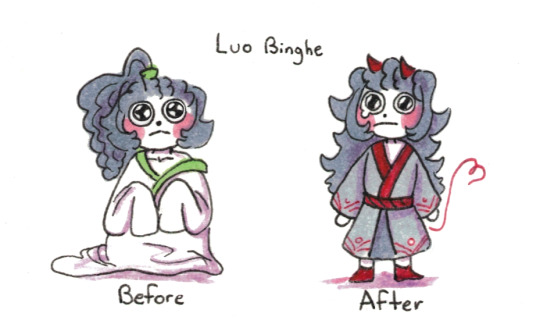
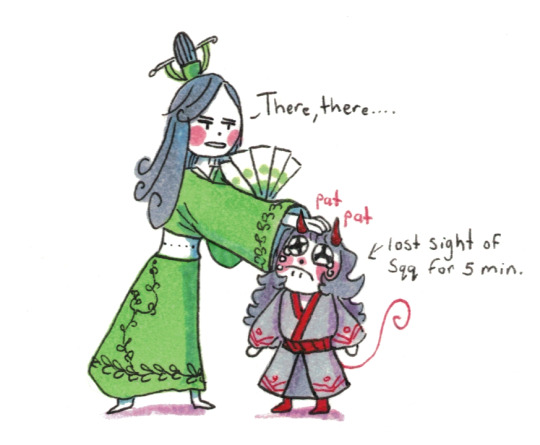
I take back my former Luo Binghe design. Big Buff Binghe is too standard. It's expected. The sillier angle to take is: manifesting his small, needy dog energy into physical form.
#poorly drawn svsss#svsss#luo binghe#shen qingqiu#I haven't been drawing these little guys silly enough and I need to fix that.#is this partially inspired by the crowd of people that whine about fanart not being 'canon accurate'? Yes.#I'm going to make these characters silly and no one can stop me!!!#Canon accurate LB is 188cm tall. PD-SVSSS LB is 3cm tall. He gained 2mm of height after the timeskip.#This little guy is DENSE. He is heavy and hard to pick up and hold. But SQQ will do it. He will find a way. He can have uppies.#He is also *so* good at cuddling. If you even care.#And yes. I want to give him little horns and a tail. They came in after his awakening.#I think I'm gonna keep up the 'svsss demons have horns and little tails' thing because i find it cute <3
2K notes
·
View notes
Text
merlin (immortal) giving arthur (pendragon) the only blade that could kill him
#they make me SICK#i hate them so much#if arthur had found out about his magic earlier and took it poorly…he’d be the only person able to kill him#merlin handing over the sword as a symbol of his utter trust in arthur#god imagine arthur finding out (au everyone lives) and being torn between wanting to cast the sword away but also wanting to keep it on him#he hates the weight of merlins life that now seems attached to the blade#he doesnt want it#but he cant cast it away bc what if someone gets their hands on it?? then merlins life is in their hands#he is BAFFLED that merlin would give HIM - uther pendragons son - the only thing that could kill him#he asks after days of fitful sleep and consideration and merlin is just like#‘its /you/ arthur.’ he says like its painfully obvious#NCJGSKSNSDIBSKSB TEYH MKAE ME VIOELTNT#bbc merlin#merlin emrys#arthur pendragon#excalibur#immortal merlin#merthur#im just thinking of percabeth when percy tells annabeth where his mortal point is and she is the ONLY person who knows#and she has to carry that tidbit of information around like its not the heaviest burden shes ever carried - more so than the sky#that one quote 'love is giving someone the power to destroy you but trusting them not to'#idk you get it#arthur and annabeth being the only people who can destroy the one they love#merlin and percy having unwavering trust and faith in their other half that they place their life in their hands#literally#sorry im done
758 notes
·
View notes
Text


peppino and noise character studies
in this essay i will explain why i am the only one to understand these characters
#pizza tower#peppino spaghetti#peppino#the noise#noise pizza tower#sklart#ive been meaning to make a character study on these two for a bit#unfortunately something absurdley petty on my end motivated me to do so#genuinely it is a huge pet peeve when people give noise the twirly stache out of costume#not only does it hinder the fact that pep and noise are so visually opposite and have like 2 things in common that way#that being their skin is white and they have black hair#but it also removes another visual indicator of making The Noise and Theodore different people#noise is a character he plays#sure some aspects of said character show in theo#like his shit eating tendencies and his pettiness#but theyre Different#if an au has it then thats fine i think#and the last thing i want is people using this as a way to harass artists#but oouughhh KEEP THE FAKE STACHE ITS A PART OF THE BRILLIANT CHARACTET DESIGN#MAKING IT REAL WEAKENS THE CONTRAST#AAHHHH!!!#THE THINGS THEYRE SUPPOSED TO HAVE IN COMMON IS PERSONALITY!!!#THEYRE BOTH PETTY LOSERS!!!#THEY BOTH PROVOKE EACH OTHER CONSTANTLY#AAAHHH!!!#thank you for coming to my ted talk#as an undertale fandom vet its my biggest pet peeve when people misunderstand characters i like#no hate to anyone ever. do what you want forever#but also Only I Get These Guys#one day i will make an analysis of the similarities they DO share
263 notes
·
View notes
Text
yknow what's fucking ironic. that helena was so jealous of helly, so jealous at seeing her be the recipient of genuine love and care from others, that she tried to kill her and steal her identity so that she could have that love instead. and then as soon as irving finds out she's not really helly, he is so horrified and so disgusted that he's prepared to kill her to bring the real helly back. he was prepared to die trying. irving would literally rather die than give helena goddamn eagan the love he has for his helly r. rich girl learns the hard way that you can't just cosplay your subjugates and expect to be loved and accepted by them
#even with mark she only got him to do all that cuz he had no idea who she really was!#anyways im literally sitting here sobbing over irving giving his life to bring his helly back#he died to fight against the selfishness of those who keep him powerless#he gave his life so helly could have another chance at hers#he didnt care about himself but hed never let his kid be used like that. over his dead fucking body#helena is such a compelling villain genuinely but rn im loving hating her#seriously just let me hate her this week. irv is dead because of her selfishness#this is the thing. when the ruling class make selfish decisions people get hurt and die@#and its never them who really suffers the consequences. its those beneath them#severance#severance spoilers#irving bailiff#helena eagan#meta tag
176 notes
·
View notes
Text
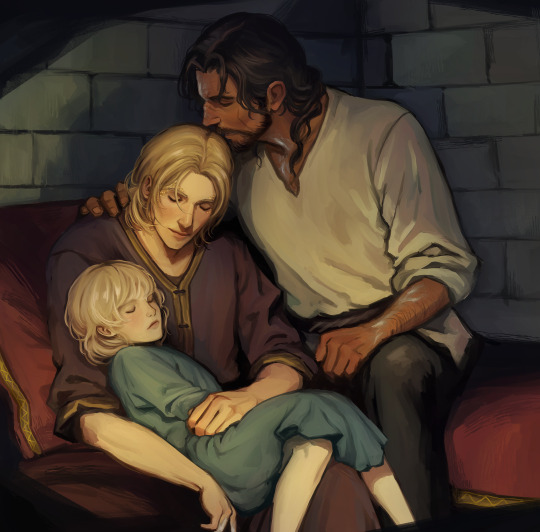
Family cuddle
#rote#realm of the elderlings#my art#rote fanart#fitzloved#fitzchivalry farseer#the fool#beloved#bee farseer#assassin's fate#assassin's fate spoilers#fitz and the fool trilogy#fitz and the fool spoilers#rote spoilers#art#illustration#Today it's been exactly one year since I posted my very first rote fanart! So this is something of a redo of that same idea.#That fanart was the first thing I drew after years of not even touching a pen and honestly I was a nervous wreck when I posted it.#But as it turned out. the people in this fandom are incredibly nice and welcoming. so thank you all for always giving me the motivation#to keep practicing and drawing/painting these amazing characters <3#(and sorry for writing a sappy novel in my tags lol)#anyway i will forever be thinking about AUs where these three get to be an actual family. they deserve it
711 notes
·
View notes
Note
tell ren to turn his location on👉👈
I saw one of the posts of how ren does get jealous of pets being loved over him and alll that so now I have the thought of the one meme of ‘ah yes, me, my partner and their [enter normal pet size] foot [pet]’
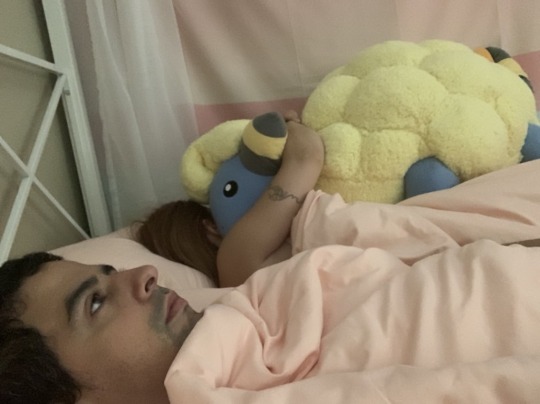
I don’t have anything else, it did pop into my head though and I thought I’d share with the class.
⌞♥⌝ ItsNotVivy on Twitter actually made that exact meme with Ren a looong time ago!!
#💌 — answered.#💖 — 14 days with queue.#thegoofyest#In Viv we trust 😌 They were one of the very first people to take an interest in 14DWY!! /gen#Dare I say..... One of the founding fathers lmaooooo#Also!! Viv (along with a few other twitter artists) were one of the main reasons why I started this Tumblr in da first place! ^^#14DWY didn't have much of a following until they started makin memes and art on Twitter#Then all of a sudden I had all these people wanting to know more about the game; and da next thing I knew; I had over 50 asks overnight lol#So I owe a lot of 14DWY's success to ItsNotVivy; hmimprvmntbsmnt; dreosuger; Diachuu; glade_o; Meowastrophe; noullyart; etc.#And it's also the reason why I wanna show my appreciation towards them all by giving them Easter Eggs in the game#I also kind feel like it's the very least I can do to show my appreciation ghjsgjh ;v; Same with da 14DWY staff on Discord#It's the only place where I ask for help regarding managing the 14DWY socials (everywhere else is just me); and they go through hell n back#—to keep the server a fun and lively place for everyone#I owe so much to them as well; which is why some of da mods already have their own lil Easter Eggs in the game#I also like to think they're canon employees at the Corland Bay library gsdjgjg Except Jesse; that mf would set everything on fire /silly#Also not me getting mushy in the tags????????? What is happening to me.... Where is my mysterious and aloof persona...... /j#I'll shuddup now before I start crying (/pos) over the founding fathers on Tumblr as well lmao
202 notes
·
View notes
Text










drawing your favorite guys being silly is very effective at keeping The Horrors at bay
bonus doc from a different canvas:
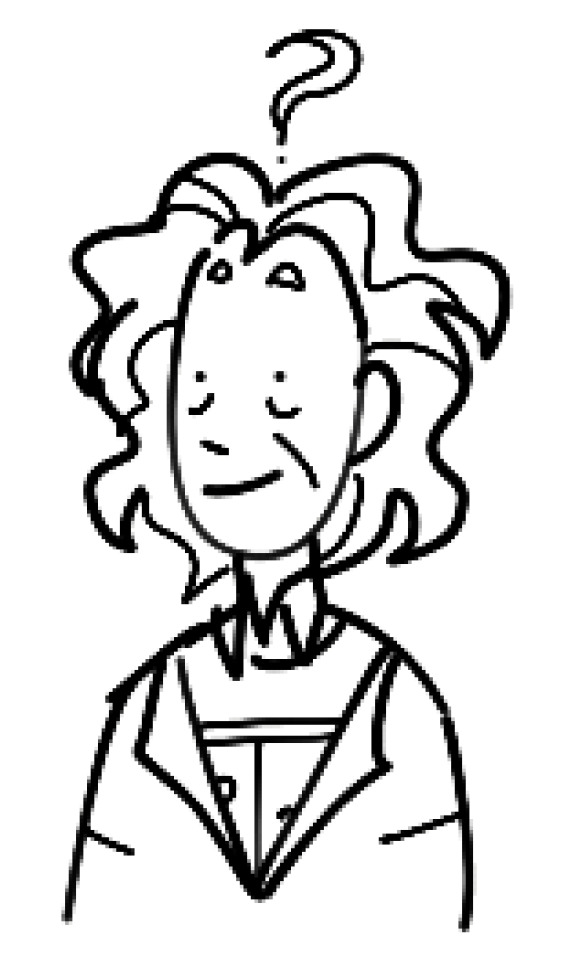
#back to the future#bttf#bttf fanart#marty mcfly#doc brown#emmett brown#kit does an art#yeah i have ten million other things i should probably be drawing instead (rip askbox left to dry...) but#sometimes you just need to draw your favorite guys giving each other physical affection. actual health benefits from this. would recommend#was feeling The Horror beforehand and then i drew them hugging and suddenly The Horror was gone! scientifically proven [citation needed]#the one where doc picks him up and spins him around makes me unreasonably happy i love being an artist!!!!#some of the other little doodles were just bc i still had the doodle bug but didn't want to commit to another big drawing haha#when in doubt give them the dotdotdot expression#the first drawing is based off of this gifset i saw of mjf jumping into other people's arms#good gifset. will need to look for it again. that man can jump#it's also a redraw! i drew the same thing when i first fell into this fandom hole#but that was before i knew how to draw them 100% so i never posted it haha#i love their stupid antennae. especially docs. he can go ! and ? and sometimes <3 it's so funny to me i love that thing#the one where he's sending radio waves to marty is soo stupid i keep laughing when i look at it#'marty. do not listen to that guy call you a chicken. stay calm' 'shit the signal's weak he didn't get my message'#tag as ship and a plague of locusts will be upon ye.#and yes. they are invasive and WILL wreak havoc on your local native wildlife
190 notes
·
View notes
Text


something something sewing event
#honami making leoneeds outifts / repairing shihos jacket and tsukasa sewing little clothes for bunny. win#project sekai#pjsk#prsk#proseka#honami mochizuki#tsukasa tenma#wxs#leoneed#I hate twt i love having everyone who slightly annoys me blocked or muted. sorry#NOBODY FUCKING KNOWS HONAMI LIKES TO SEW ITS MAKE ME MADE STFU ABOUT TSUKASA. MY FRIEND HONAMI.#holdee of both opinions that its a shame mixed events have been weak writing wise and also havent been used to their fill potential recentl#to have characters who dont normally interacted get to meet each ofher. And tsukasas writing in particular is hurting bad rn#But also pjsk fandom does have misogyny issues (Because every fandom does bc all forms of bigotry oremeate everything even shnconsciously)#Because its incredible that everyone ran to bat for tsukasa being in the event but i saw mobidy mention honami who also likes to sew ..#she even says in a card story that she wanted to remake All of leoneeds sekai outfits in real life since theyre stuck in sekai#Idk ive been oeeved about this so i must rjn to my oersonal disry (tumblr tags)#also I need honami and mafuyu interaction proper like what the fuck is going on. there could be the chance for very interesting growth if#clpl would give them the chance ..#tldr It is really annoying when clpl constantly forgets shit about their own characters 😭😭😭😭#/ seems too scared to let mixed events be Actually kmportant to the story / characters rceently. Which is crazy#esp for wxs whose entire thing is about how other people have shaped them and how theh wantnto touchnpeoples lives 😭😭😭😭😭aWhatever YAP OVER#But i love shizuku so im not complaining about anything other than who keeps inviting len
164 notes
·
View notes
Text
Waiting for onscreen updates on Will Putnam, Theo Dimas, Charles’ stepkid and literally any of Mabel’s love interests

#like the show is obviously still fun and keeps surprising me#but we’re 4 seasons in and I’m starting to worry about how many important/interesting characters they’ve dropped like hot potatoes#like Theo Dimas bias is one thing but why hasn’t Oliver talked to HIS OWN SON#for a whole season soon#and he still doesn’t know about the Teddy twist#Charles’ step kid was apparently one of the most important people in his life and we don’t even hear about texts from her#stop giving me cool characters and plotlines to get excited about if they’re going to be dropped#in favour of stacking a season with 50 famous guests that don’t impact the trio beyond a singular mystery#only murders in the building#omitb#theo dimas#will putnam#lucy only murders#omitb memes#my memes
270 notes
·
View notes
Photo
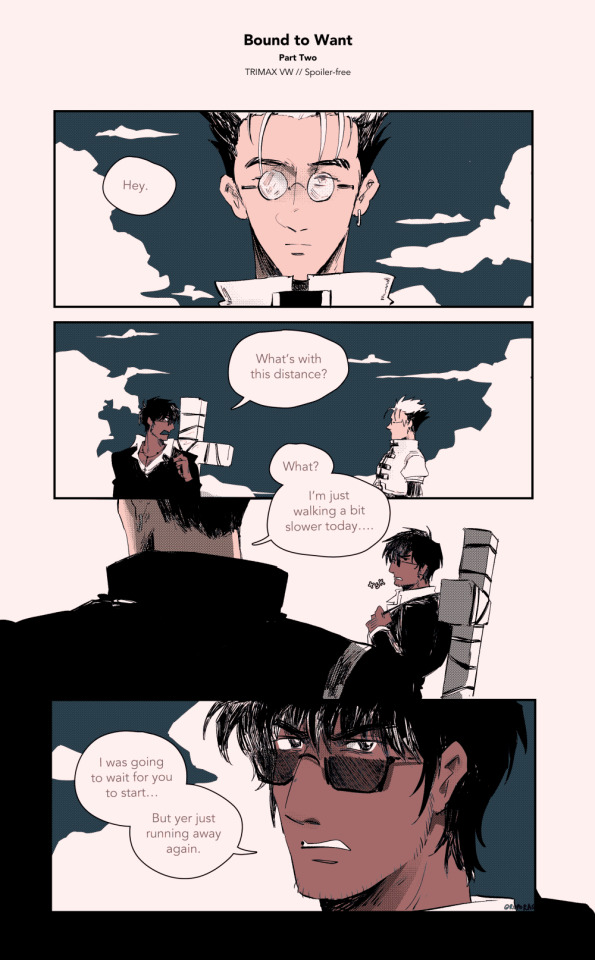



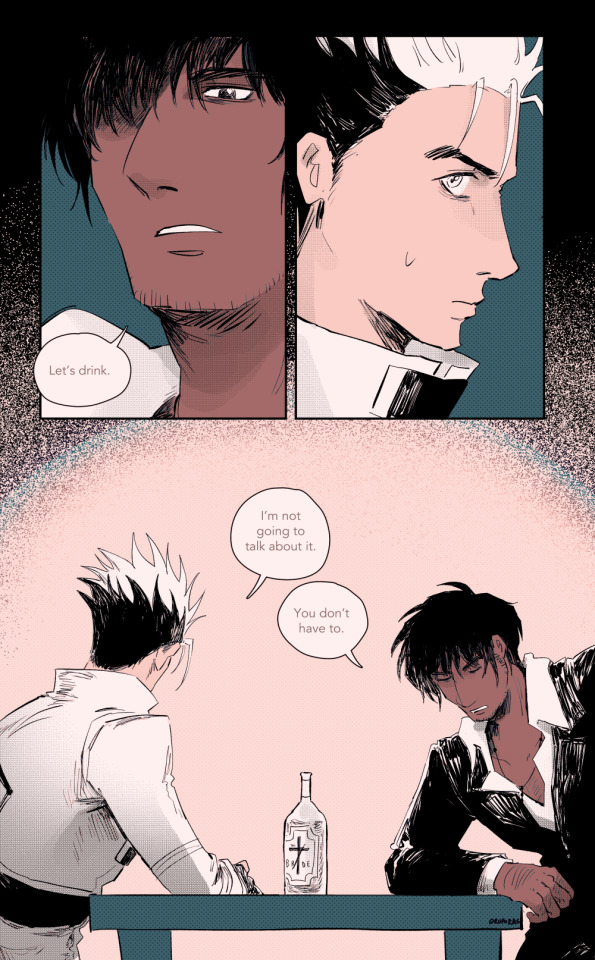
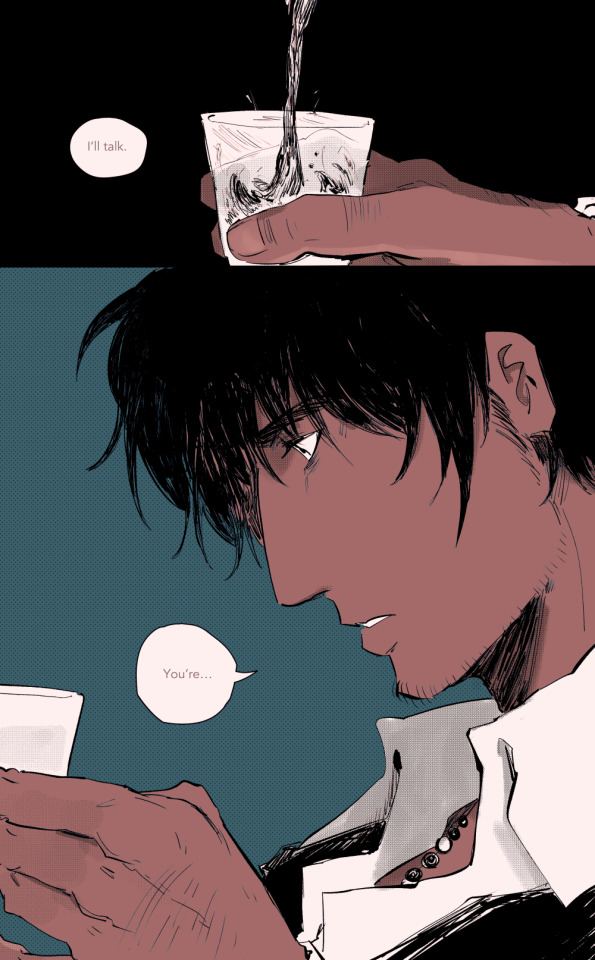
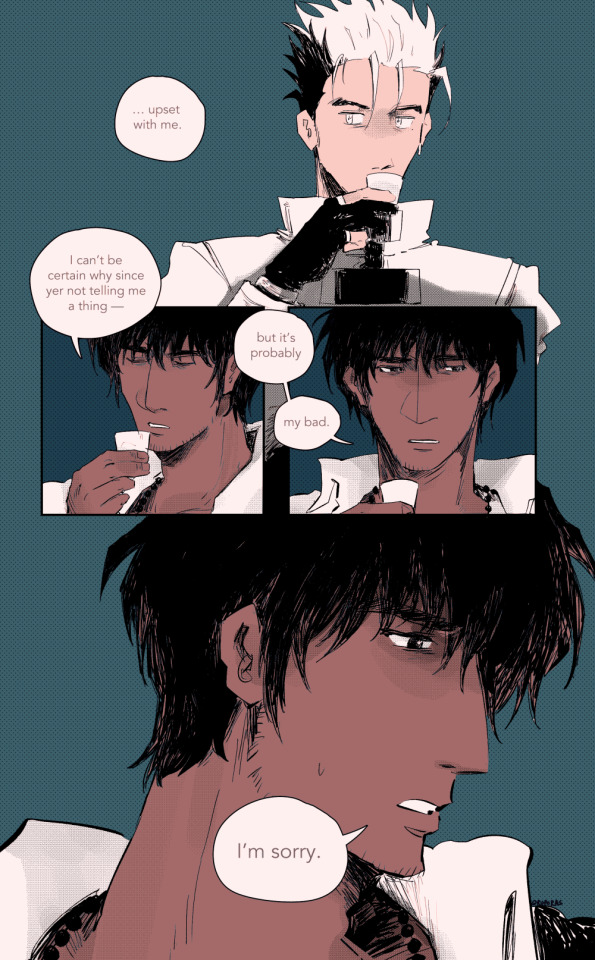

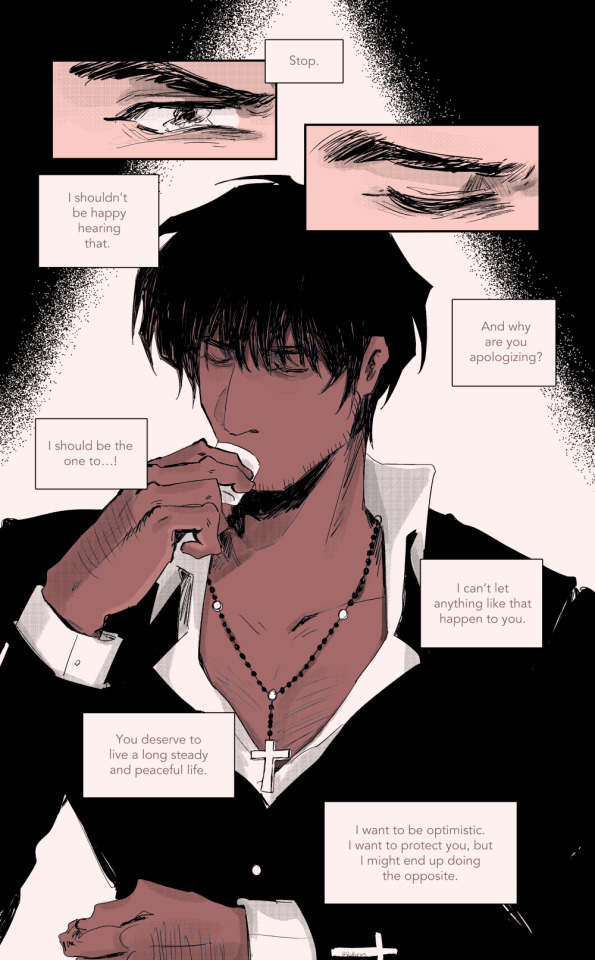
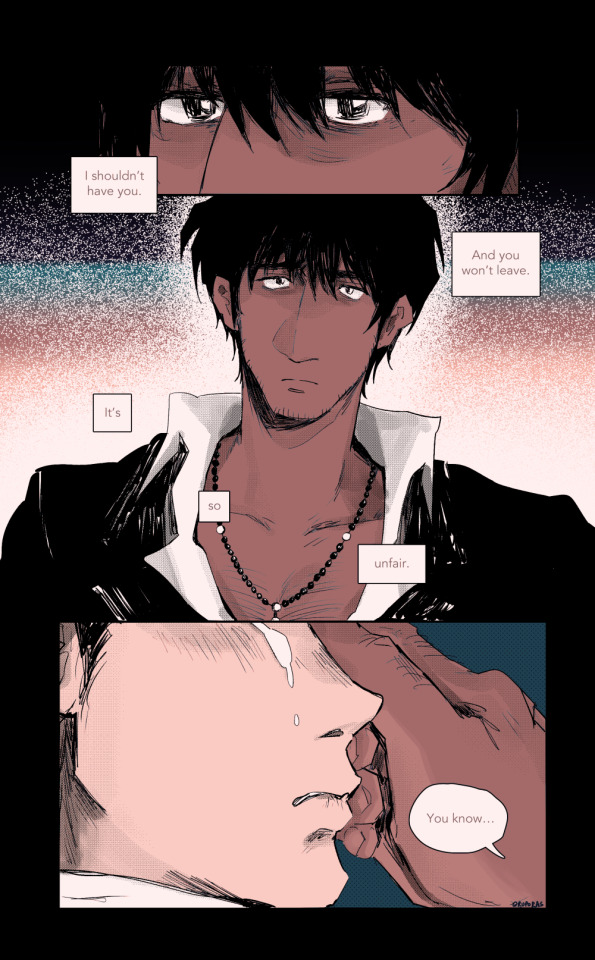
bound to want (part two) /// part one rest of pages under READ MORE after ID
[ID: 23 page digital comic of Vashwood from Trigun Maximum. The comic is in a limited palette of a dark blue, light pink, white, black, and a light beige color for Vash's skin and a mid-brown color for Wolfwood's. This comic is the second part to "Bound to Want" and is spoiler-free. The first part is linked here.
It begins with a panel close up of Vash's expressions. The sky colored in dark blue can be seen behind him. He has a neutral expression, but he holds a slight frown and the reflection of his glasses covers one side of his eyes. Wolfwood says, "Hey. What's with the distance?" In the second panel, the shot widens to show both of them, a clear physical distance separating them with Wolfwood walking ahead and Vash trailing a little behind. Vash responds, "What? I'm just walking a bit slower today..." Wolfwood looks at him with a an irritated expression, clicking his tongue. Wolfwood says, "I was going to wait for you to start... But yer just running away away."
Vash is seen looking away, unable to hold eye contact with Wolfwood as he continues, "You've been avoiding me since that night. Did ya think I wouldn't notice? It's about that dream, right? Tell me about it already if you're going to be moping like this." Vash looks slightly downwards, his brows furrowing and he starts to walk ahead of Wolfwood without looking at him and responds stiffly, "I really don't want to talk about it..." Wolfwood looks at him with a surprised expression, but doesn't probe.
A panel close up to Wolfwood's eyes as he watches Vash go on ahead before he follows suite with an irritated sigh. The panels are overlapped by Wolfwood's hand holding the bottle of the Bride with motion lines, indicating a transition in time.
A wide shot of Vash and Wolfwood in a room now. Vash is seated, his back turned away from the viewer, while Wolfwood's body faces the viewer with his eyes looking towards Vash. He rests the bottle of the Bride on the table with a "clack" and his other hand holds two shotglasses. The background is coated in a light pink.
A panel shows a close up of Wolfwood's face, his eyes looking downwards to Vash as he says, "Let's drink." Next to this panel is Vash looking up at Wolfwood, his brows furrowed and a slight frown. The bottom half of the page is a wider shot with Vash's body turned away from the viewer as he says, "I'm not going to talk about it." Wolfwood responds, "You don't have to." as he sits down.
A wide panel of Wolfwood holding the shotglass, pouring in the drink as he continues, "I'll talk." The next panel is a profile view of Wolfwood, his eyes looking down at the now filled shotglass as he continues to say, "You're..."
"... upset with me." Vash can be seen next to this speech bubble with narrowed eyes, looking towards Wolfwood. The panels are all coated in with a dark blue background. Wolfwood continues, "I can't be certain why since yer not telling me a thing -- but it's probably... my bad." The panels show Wolfwood about to bring the shotglass to his mouth but he turns way as he continued to speak, his eyes not on Vash. The bottom page shows him looking away completely with a guilty expression as he says, "I'm sorry.
If you can ever tell me why, I can try and adjust to make it more bearable. But if you're just trying to get rid of me--" The panels follow Wolfwood's certain expression as he says this, "I don't intend to leave you. I can't... and I won't." A panel shows Vash's wide-eyed expression, surprised upon hearing this, and then his eyes soften as Wolfwood again concludes with, "I'm sorry."
Vash's inner thoughts begins, a boxed speech at the center of the page and panels of his eyes, his brows furrowing again and a resigned, but frustrated expression. His thoughts starts, "Stop. I shouldn't be happy hearing that. And why are you apologizing? I should be the one to..! I can't let anything like that happen to you. You deserve to live a long steady and peaceful life. I want to be optimistic. I want to protect you, but I might end up doing the opposite." The text surrounds Wolfwood from Vash's perspective, the other man drinking out of his shotglass, his eyes downcasted.
"I shouldn't have you. And you won't leave." Behind these text is a panel of Wolfwood's eyes finally looking over to Vash. Vash's thoughts continues, "It's so unfair." When Wolfwood sees Vash, his eyes soften and he frowns. The last panel shows the lower half of Vash's face, but tears begins to flow down his cheek. Wolfwood's hand is already reaching to wipe at them as he starts to say, "You know..."
A wider shot of Vash and Wolfwood, Vash slightly leaning forward with his mouth tightly shut, and tears steadily continuing to flow out of his closed eyes. Wolfwood continues to wipe at them with his hand as he continues, "This isn't a dream anymore. I don't know what you saw for you to be this shaken up, but whatever happened, you'll overcome it, right? If not you, I'm here too. You'll be okay, Spikey. So..." Wolfwood's expression grows more tender, "Have a little faith in me... and come back already." The dark blue starts to fade.
The wide panel has the dark blue background faded and replaced is the light pink. It shows Vash in full up to his shoulders, his eyes are still tears littered, but there's light in them as he says, "Wolfwood..." making eye contact with the other. The next panel shows Wolfwood's tender expression, his eyes and brows fully soften and he has a small smile on his lips, finally seeing the other return a level of sincerity with him.
The next panel shows the bottom half of Wolfwood's face and his hand is offered towards Vash for a dance as he says, "C'mon. We don't have to talk, but this is okay, right?" The background is now white and a ribbon flowing across the page separates this panel from the next sequence. Vash's inner thoughts continus, "I've spent too long avoiding this. It's scary to want after I've taken so much from others." A sequence close up of their hands is shown, with Wolfwood's outstretched hand on the right and Vash's reaching hand on the left. Vash gently places his hand in Wolfwood and at the bottom, Wolfwood wraps his fingers across Vash's.
Throughout the page, a dark blue ribbon starts to flow around the both of them with confetti raining alongside the effect. Vash and Wolfwood are hand and hand, dancing together with Wolfwood as the lead. The viewer can see a peak of Vash's expression, full of fondness but also a hint of sorrow as he looks down at Wolfwood. His inner thoughts continue, "I don't deserve this. I don't deserve you. But why is that even though I have these burdens, I still want to love you. I still want you to be by my side."
With a close up of their mouths, Vash's thoughts continue, the text covering his mouth, "Wolfwood, I--" Wolfwood's speech bubble covers Vash's text as he completes his sentence, "want you." Vash's eyes widen for one panel and in the next, his eyes spark, a blush appearing on his cheek and the confetti flows and spark. Tears ease up on his eyes again.
"Want me too already, Spikey." Wolfwood has leaned in enough to rest his head against Vash, a hand of his on Vash's neck, holding his nape and another hand pressed gently against his back. A ribbon separates this panel from the next, a mix of confetti flows across the page, as Vash envelopes Wolfwood in a hug too, holding him and his hand gripping tightly onto his back.
This page is just the ribbon flowly throughout the page on the white background, one white ribbon and the other a dark blue. Near the bottom, the ribbon envelopes each other in a loop. A conversation of Vash and Wolfwood is held over these ribbons, Vash starting to say, "What if I hurt you? What if you..?" Wolfwood responds, "You? How could you hurt me?" Vash, "You know what I mean... You see it everyday..." Wolfwood responds, "If you think I'm going to kick the bucket so easily, I suggest you look at me more closely from now on, idiot. I'm not that easy to get rid of."
The next page has the ribbon criss cross over the top of the page. Vash and Wolfwood can be seen in their dancing position again, Wolfwood now resting a hand on Vash's shoulder, as Vash takes the lead. Vash continues, "Well, I know that... I tried." Wolfwood responds, "But you won't anymore... since you want me... around, yeah?" Wolfwood's head cocks to the side, smiling with assurance, cheeks flushed. Vash looks at him with a wide smile and fond, loving eyes. The confetti flows across the bottom of this page and as it eases into the next page, it starts to disappear.
Vash responds, ".. Yeah... I do..." as he pulls Wolfwood into a hug again. Wolfwood says, "Not going to run away anymore, are you?" Vash says, "No... I trust you." A panel shows Wolfwood's turning away slightly with a shy expression, muttering "Geez..."
In a more simplified style, Wolfwood is seen gripping Vash's cheeks now with his hand, "Though... You do remember you avoided me for two weeks straight, right? How are you going to make that up to me?" Wolfwood asks. Vash responds with eyes closed and a pucker of his lips. A vein of irritation appears on Wolfwood's face. Wolfwood starts to squeeze at Vash's cheek with both hands, shouting, "Now that you've recovered, you're trying to be funny, huh?!" Vash says through the squished cheeks, "I'm just happy..."
The next page opens with a closed up panel of Vash's widen eye as Wolfwood's hand moves from squishing his cheeks to gently holding them and Wolfwood leans in. The inner thoughts starts again, "There's a chance I'm not making the right choice... My dreams, my fears of losing you, it will never go away. But you said you won't let it happen... And I want to hang onto your words closely this time. After all, if it's anyone who can make me believe, it's you." The white ribbon from previous pages flows across the page and it visibly ends at the bottom of the page, enclosing the two of them as they share a gentle kiss with Vash holding Wolfwood's face, a tear in his eye.
The next pages starts with Wolfwood saying, "You cryin' again?" Vash responds, "I'm just grateful..." Wolfwood responds, "But you've always had me." Vash responds, "Being like this is different from staring at you from behind all the time though..." The two can be seen together again, Wolfwood pressing his elbows against the table with Vash leaning over him. Wolfwood is easing the tears out of Vash's eye again, just like earlier. A close panel of Vash's fond expression is seen as he says, "Thank you, Wolfwood." Wolfwood looks up at him with a small smile, gentle eyes. Confetti starts to flow lightly across the page as text starts to appear against the white background, "I'm the one who's grateful...
That you'd embrace someone like me, when I'm not fit to hold you in the first place... But I know better than to hesitate. The moment I acknowledged it, I knew I'd spend the rest of my life loving you. So, have as much of me as you want, Vash."
The final page shows the confetti gently falling down the page and at the bottom shows Vash and Wolfwood pressing their foreheads together, Wolfwood's hands cupping the side of Vash's face gently, and both of them smiling brightly with each other. ID END]
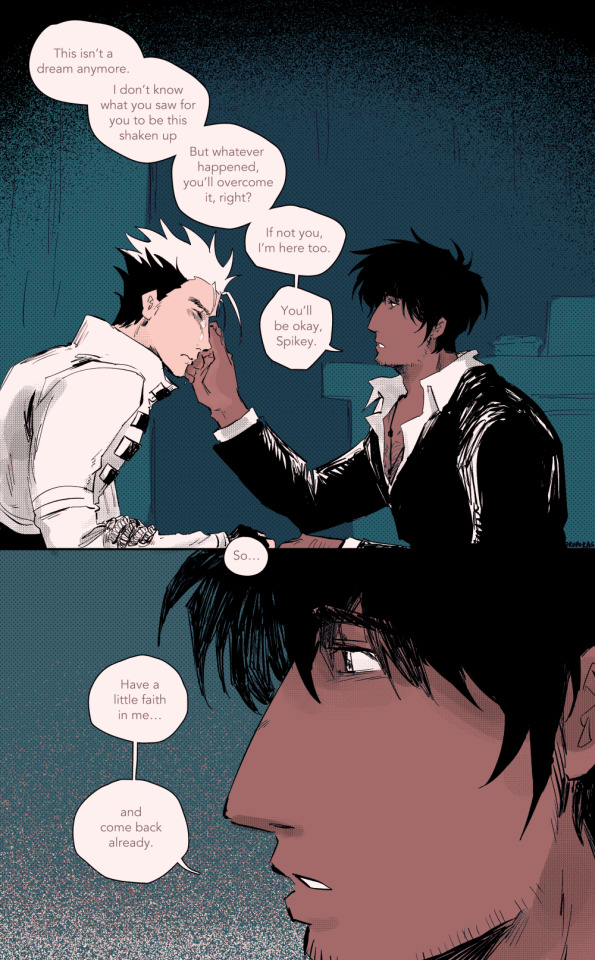

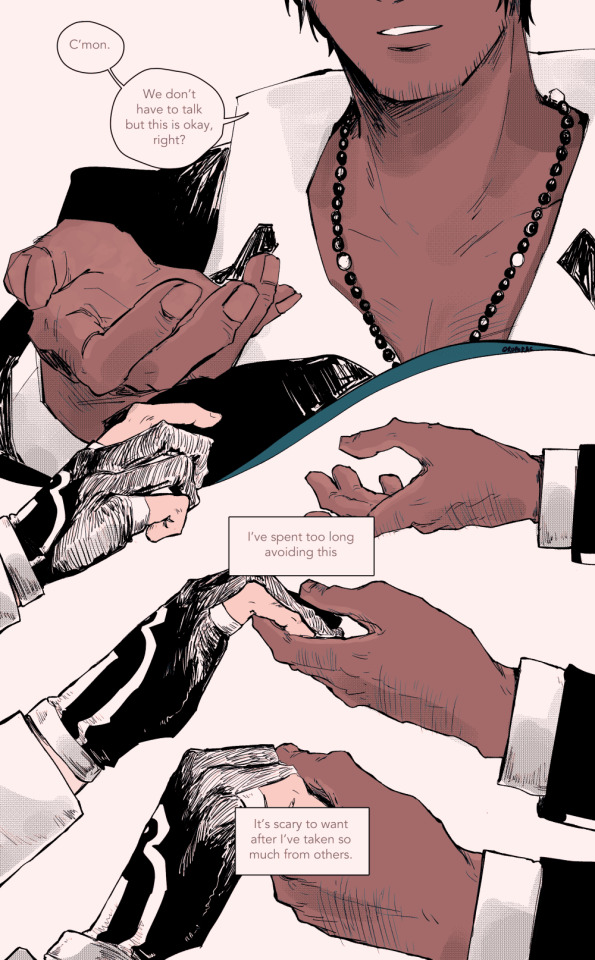

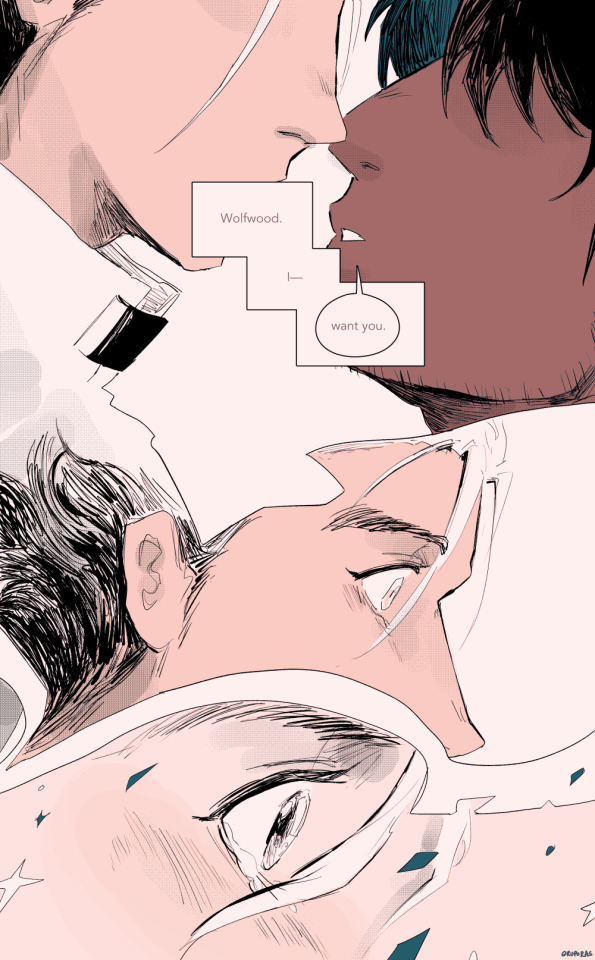
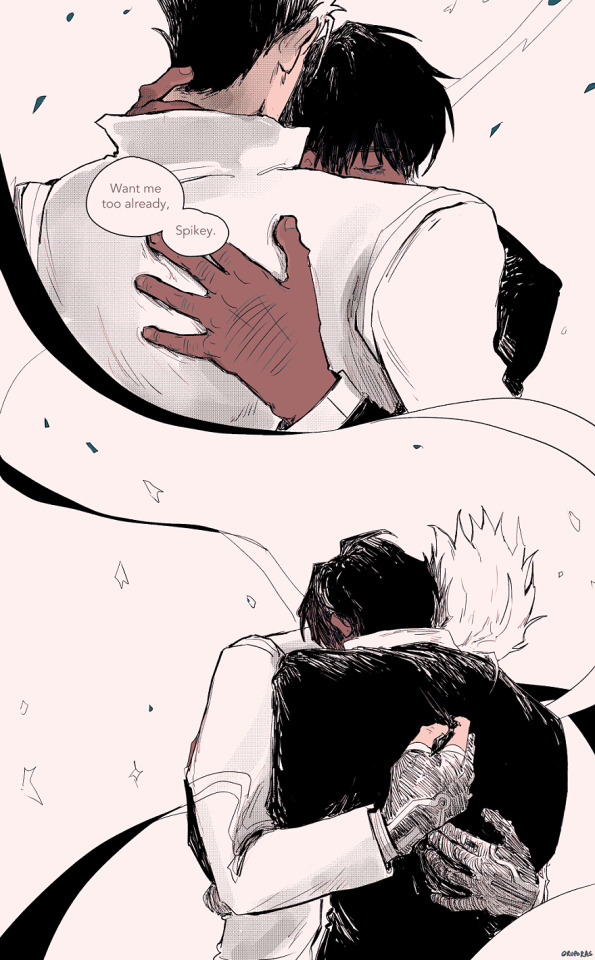
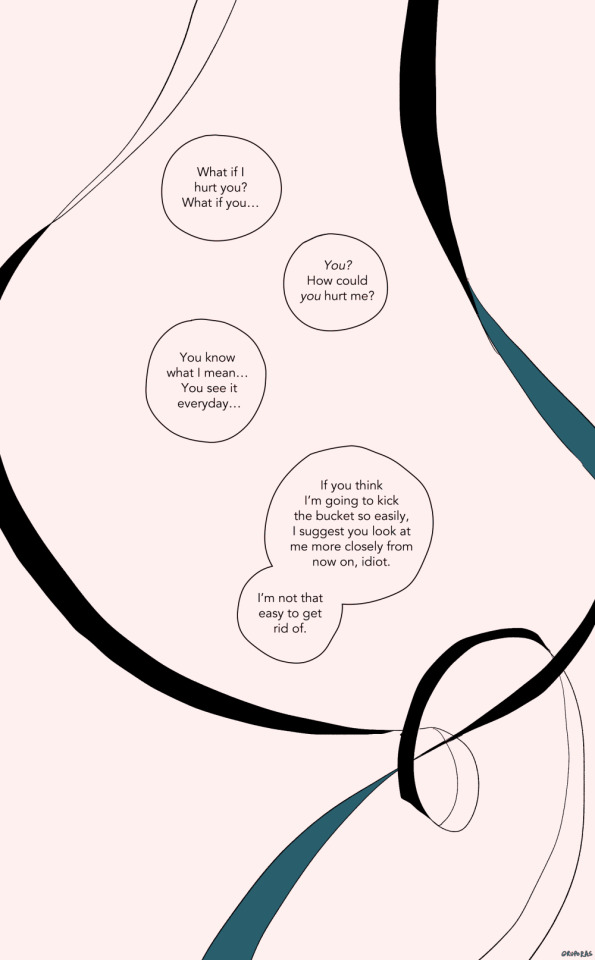
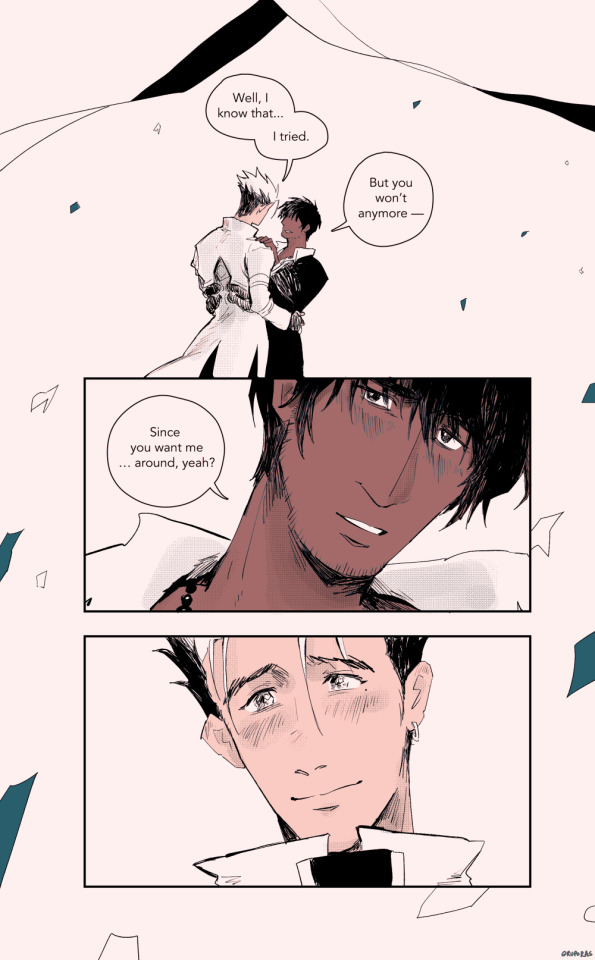
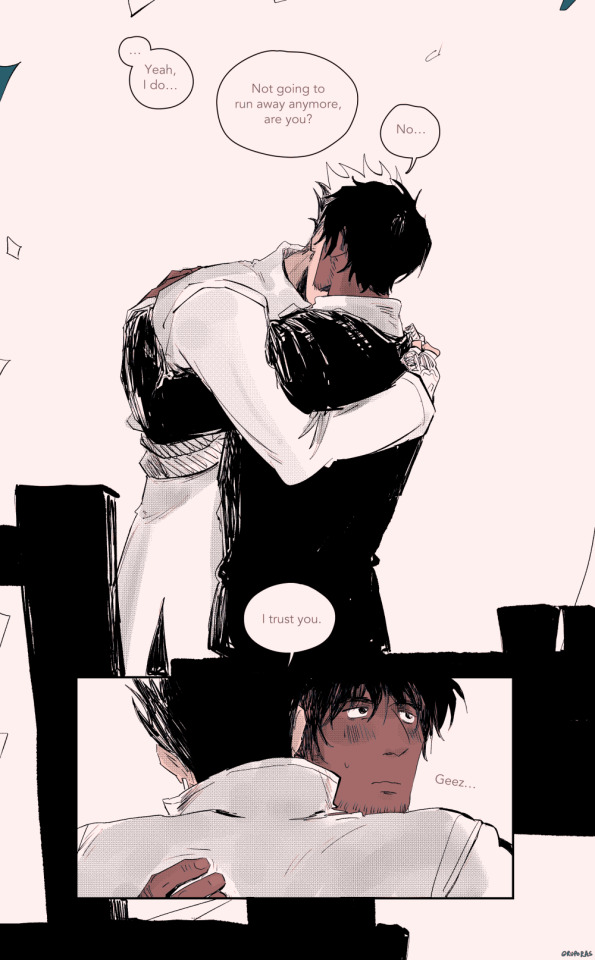

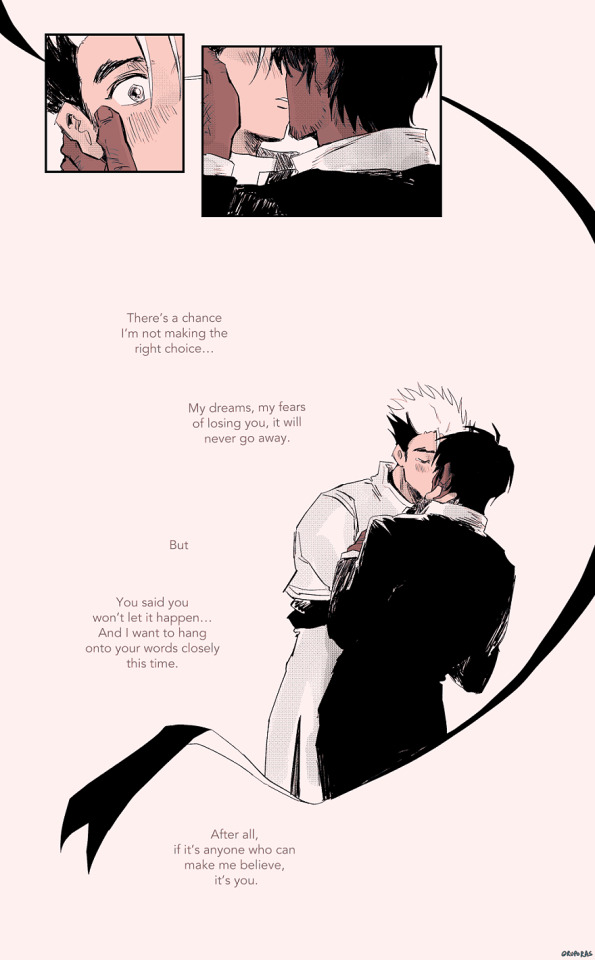
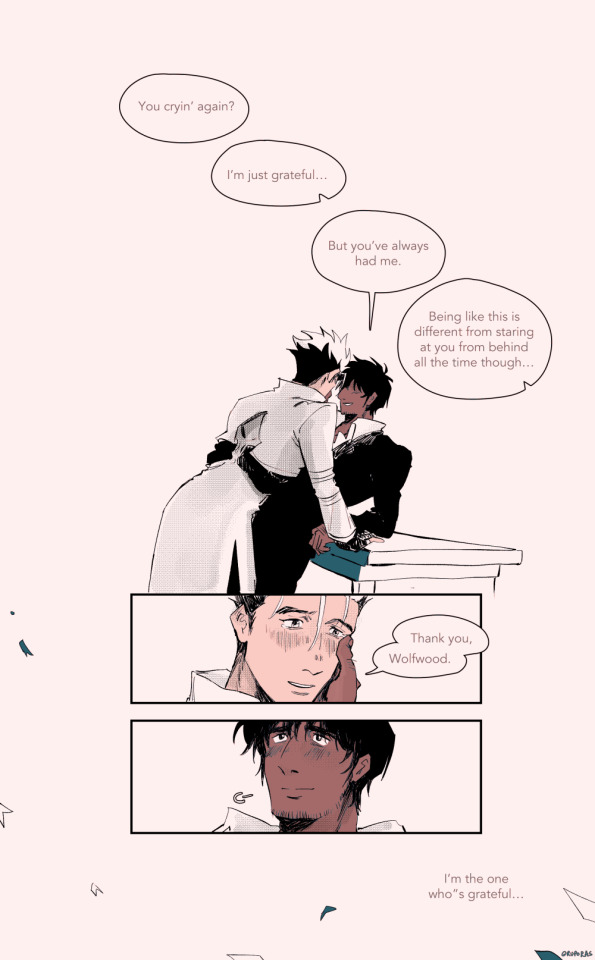
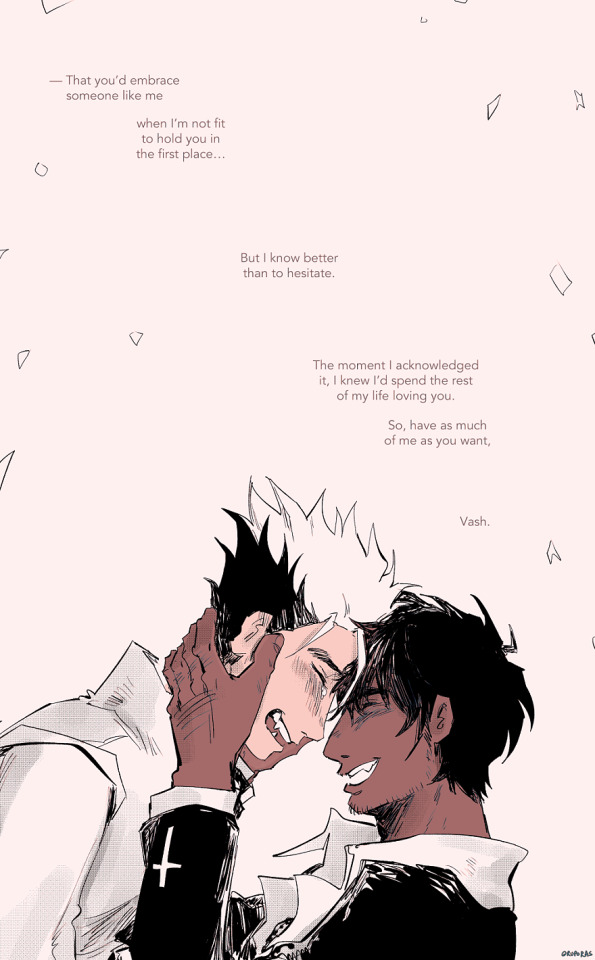
#vashwood#trigun#trigun maximum#vash the stampede#nicholas d wolfwood#its done.... after 2 months.... collapses on the ground#theres a lot of things i would prob change about this but. its so sappy that it makes me a little happy where it ended up#they deserve a little sap too!!! and in the end this is the closest they could get to a first confession#through want! want in each other's life and company since they both have this strained relationship with keeping people permanent in their#lives... and the people or things that are tied to them in the long term tend to be something that harms them.#and as the saying goes -- good things never last! and im sure they prob gave up trying to find a good thing for a long time#vash managed to be found after the moon accident and got his good thing for a bit but even he prob knew itd come to an end eventually#ironically it was wolfwood that ended it. but he really just planted smth new for vash... and now they have some security#or at least vash does. or at least just for this one moment#a moment of bliss and feeling like they are deserving of love is so Fluctuating for vashwood#and ultimately i think wolfwood could only push onwards to initiate because he sensed there was smth vash wanted. and its just#naturally in wolfwood to give to those that he love#but anyway anyway.... i like to think in a sweet universe -- they had the chance to confess like this and got a little bit of time to#enjoy and share their company in this manner. to be a little less restrained and love each other freely#ruporas art
3K notes
·
View notes